Breadcrumb
Distinguished Alumni Awards
Previous Award Recipients
2023


Kent Willis (‘69, Biology)
Received: 2023
‘69, Biology
Kent Willis (‘69, Biology), a retired middle school science and math teacher from Fortuna, has left an indelible mark on education. Throughout his career, he received notable recognition, including being named "Humboldt County Teacher of the Year" in 1977 and earning the "Excellence in Teaching Award" from the Humboldt County Office of Education in 1989.
Beyond his classroom duties, Kent actively engaged in drug education, recognizing the importance of guiding young people toward a healthy and safe future. His efforts were acknowledged in 1990 when he received the "Certificate of Recognition" from the Humboldt County Superintendent of Education. This recognition highlighted Kent's significant contributions to improving the lives of young individuals on the North Coast.
Fortuna Middle School honored Kent as "Volunteer of the Year" for teaching advanced math and supporting school events. He established college scholarships for high school graduates in Humboldt County with his wife, Marsha. Kent Willis has made a lasting impact on education, inspiring and empowering students throughout his career.


Alexandra “Xan” Bernay
Received: 2023
'97 Journalism
Alexandra “Xan” Bernay (‘97, Journalism) is an esteemed lawyer at Robbins Geller Rudman & Dowd LLP, specializing in antitrust, consumer, securities, and unfair competition class-action litigation.
Among her many cases, Bernay is one of the lead lawyers in the most significant private antitrust class action settlement of all time, a lawsuit brought on behalf of merchants who argued that the largest credit card companies and card-issuing banks violated the antitrust laws by overcharging merchants who pay fees to accept transactions. The case settled for more than $5.5 billion. That case and other significant litigation have made Bernay a respected figure in the plaintiffs’ bar. Lawdragon recognized her efforts and honored her as a 2023 and 2019 Leading Plaintiff Financial Lawyer, and Super Lawyers Magazine, named her a Super Lawyer in 2023.
As a lawyer, Bernay has made significant contributions through pro bono work, representing at-risk children and low-income clients in their pursuit of justice through the San Diego Volunteer Lawyers’ Program, a program committed to making legal services accessible to those in need.
In addition to her legal expertise, Xan is also an inventive mind. She invented a self-soothing product called Calmios, a fabric square designed to calm the mind and body through tactile stimulation, providing comfort and tranquility to those overwhelmed. She has also written several screenplays, performed stand-up comedy in New York and San Diego, and participated in special events hosted by The Moth, a well-known storytelling program.

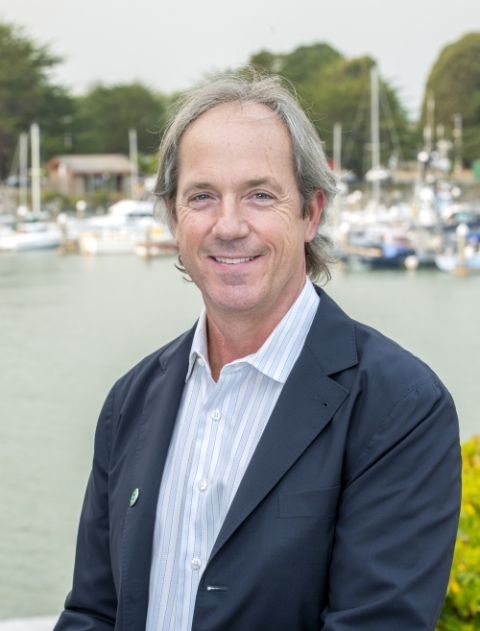
Philip Anton
Received: 2023
'98 Music
Philip Anton (‘98, Music) recognizes the vital role of a liberal arts education. His passion for music propelled him toward a successful career in technology. Currently serving on the Board of the Cal Poly Humboldt Foundation and as a Vice Chair of the Boldly Rising Campaign, he actively supports their missions. Philip's philanthropic efforts include a $30,000 gift to the Native American Food Sovereignty Lab and a $280,000 pledge to the Philip and Yuriko Anton Climate Fund.
Professionally, he has worked for Sound Chaser Music Software, Microsoft, Provide Commerce, and Intuit culminating in his role as a Group Development Manager, where he contributed to the success of platforms like TurboTax and QuickBooks. Based in San Diego, Philip Anton is highly regarded in the technology industry and valued for his passion, social impact, and professional achievements.


Peter A. Underhill
Received: 2023
'70 Oceanography
Peter A. Underhill (‘70, Oceanography) is a renowned geneticist and researcher known for his groundbreaking work in molecular analysis of DNA sequence variation in human populations.
Underhill completed a Master's degree in 1976 and a Ph.D. in 1981 in Marine Studies from the University of Delaware.
Since 1992, Underhill has been at the forefront of pioneering research on human Y chromosome diversification. His work has led to the development of a robust gene tree that provides valuable insights into human evolution, providing the laboratory equivalent of a time machine. One of his notable contributions was patenting a process called Denaturing High-Performance Liquid Chromatography, which allows for quick comparison of nucleotide sequences on the Y chromosome among different individuals. His work has been featured in The New York Times, CBS, and CNN, among other news outlets.
Throughout his career, Peter served as a Research Associate at Stanford University School of Medicine for 27 years until his retirement in 201 2017. From 1983 to 1989, he worked as a Molecular Biologist at SRI International, Menlo Park, Calif. He has shown his commitment to education and philanthropy by donating to various Cal Poly Humboldt Student Scholarships, including the Humboldt Oceanography Trust, Humboldt Student Success Scholarship, Humboldt Loyalty Fund, and the Marine Lab Enrichment Fund over the last 32 years.

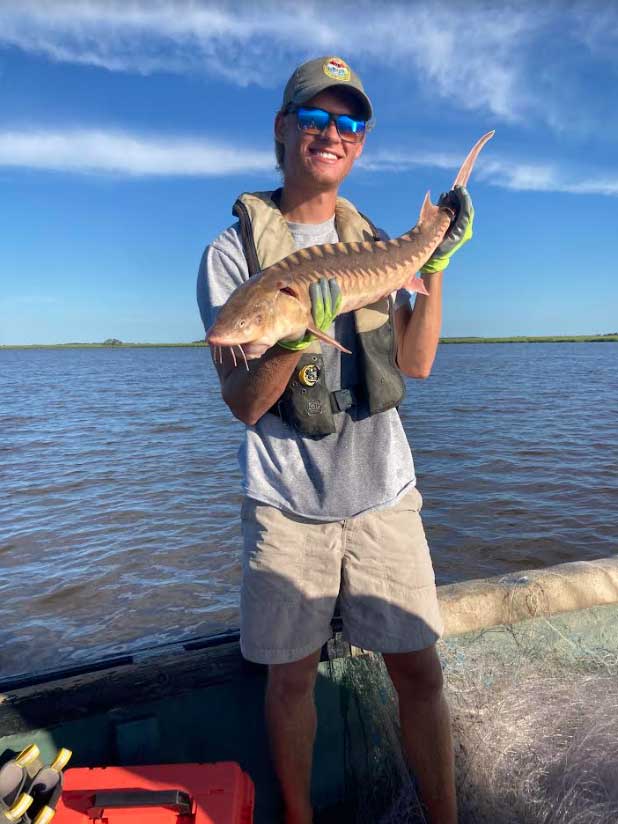
Grant Christian
Received: 2023
Michael Scott served our country both at home and abroad, and I want to thank him for hisservice. I am very honored to receive this award, and I value the opportunity to carry on hislegacy in the fisheries field. I want to thank all of the fisheries faculty, as well as my family andfriends for supporting my education during my time as an undergraduate.
Looking back, Cal Poly Humboldt was the perfect place for me to attend college. I say thisbecause I strongly feel that the education I gained here was completely unique, and could not bereplicated anywhere else in the world. Specifically, the fisheries program has provided me withunique opportunities to: interact with indigenous communities, trawl for offshore species,explore ancient forest creeks, perform extensive genetics labwork, and work in a fullyfunctioning fish hatchery on campus. These opportunities only exist because of a faculty thatreally cares about exposing their students to as many hands-on experiences as possible. I thinkit’s also important to note that my college experience was significantly hampered by theCOVID-19 pandemic, and I still was able to gain, what I believe to be, a world-class education.Once again, thank you to all the faculty and staff that make these experiences possible forundergraduate students.
I grew up in the Pacific Northwest and watched firsthand as several of the fisheries I loved wereforced to close due to low population numbers. I want to stop this from happening in the futureby working to create regulations that are better at sustainably managing fisheries for the benefitof people and the environment.
2022


Michael Lynch
Received: 2022
'11 Business Administration
Michael Lynch (‘11, Business Administration) is a social entrepreneur and certified professional fundraiser. He is the Co-Founder and Chief Executive Officer of Improve Your Tomorrow, Inc (IYT), an education nonprofit that, for the last 10 years, has worked to close the college opportunity gap and improve the life outcomes for thousands of young men of color across Northern California.
After receiving his bachelor’s degree in Business Administration and a Master’s in Public Policy and Administration from Sacramento State, Michael began his career as a Senate Fellow in the California State Legislature. He quickly became a senior policy advisor for a State Assembly member, where he staffed dozens of bills, nine of which became law. Michael serves as a Governor's appointee to the Commission on California Volunteers, a Senior Fellow for the American Leadership Forum, and a Senior Fellow for the Nehemiah Emerging Leaders Program and the Sierra Health Foundation’s Health Leadership Program. Michael has been recognized among the top 25 Black Changemakers by the Sacramento Bee, 40 under 40 by the Sacramento Business Journal, and 100 business leaders by the Sacramento Magazine.


Cassandra Hesseltine
Received: 2022
'96 Psychology
Cassandra Hesseltine (‘96, Psychology) is a trailblazer in the world of film as the current Humboldt-Del Norte County Film Commissioner. Since 2010, she has been instrumental in creating temporary jobs in the region while stimulating the economy with outside dollars by assisting film productions in shooting among the redwoods.
Before becoming commissioner, she spent decades working in theatre, TV, and film throughout California, gaining extensive experience in the entertainment business.
Hesseltine facilitated the creation of captivating films, magazine photoshoots, print ads, TV shows, and commercials within Humboldt and Del Norte counties. She assisted in countless projects filmed in the region, like Swiss Army Man and Bird Box, and big-budget studio productions, such as A Wrinkle in Time.
Hesseltine has gained respect and accolades from industry professionals within the local region she represents, the state, and worldwide.
In 2015, as a Film Liaisons In California Statewide (FLICS) member, she worked to expand California’s TV and Film tax incentive program, helping California remain the top production center in the world. For three years, she served as the President of FLICS, showcasing her profound expertise and dedication. Additionally, she holds certification as a film commissioner from the Association of Film Commissioners International (AFCI).
In 2017, she won Woman of Distinction, presented by the Kiwanis Club of Henderson Center at the Fourth Annual Women in Business Luncheon. In the fall of 2019, she was one of five finalists for Outstanding Film Commission in the world for Location Manager Guild International’s award show for her work on A Wrinkle in Time.


Jack McGurk
Received: 2022
'66 Biology
Jack McGurk (‘66, Biology) spent 30 years working in the California Department of Health Services. He served as chief of the Environmental Management Branch and oversaw eight environmental health programs, including medical waste management. Jack was crucial in developing the California Medical Waste Management Act legislation. His innovative medical waste reduction and pollution prevention program was honored with 2002, 2003, and 2004 Champion for Change Awards from Hospitals for a Healthy Environment. The U.S. Environmental Protection Agency awarded him the 2004 Region IX Environmental Award for outstanding achievement in leading those efforts. As the owner and president of Systems Improvement Initiators, Inc., he offered expertise and guidance to businesses and hospitals to help improve operations and implement cost-effective environmental solutions. Jack assisted hospitals in reducing healthcare-acquired infections through improved cleaning techniques.
Jack's commitment extends to education, as he serves as the Cal Poly Humboldt Foundation Vice Chair and created two Cal Poly Humboldt scholarship endowments for nursing and marine biology students, totaling $500,000. Inspired by his wife's battle with cancer, the nursing scholarship honors those who provided their family with exceptional care. McGurk's dedication to positively impacting Humboldt students’ lives is evident in all his endeavors.

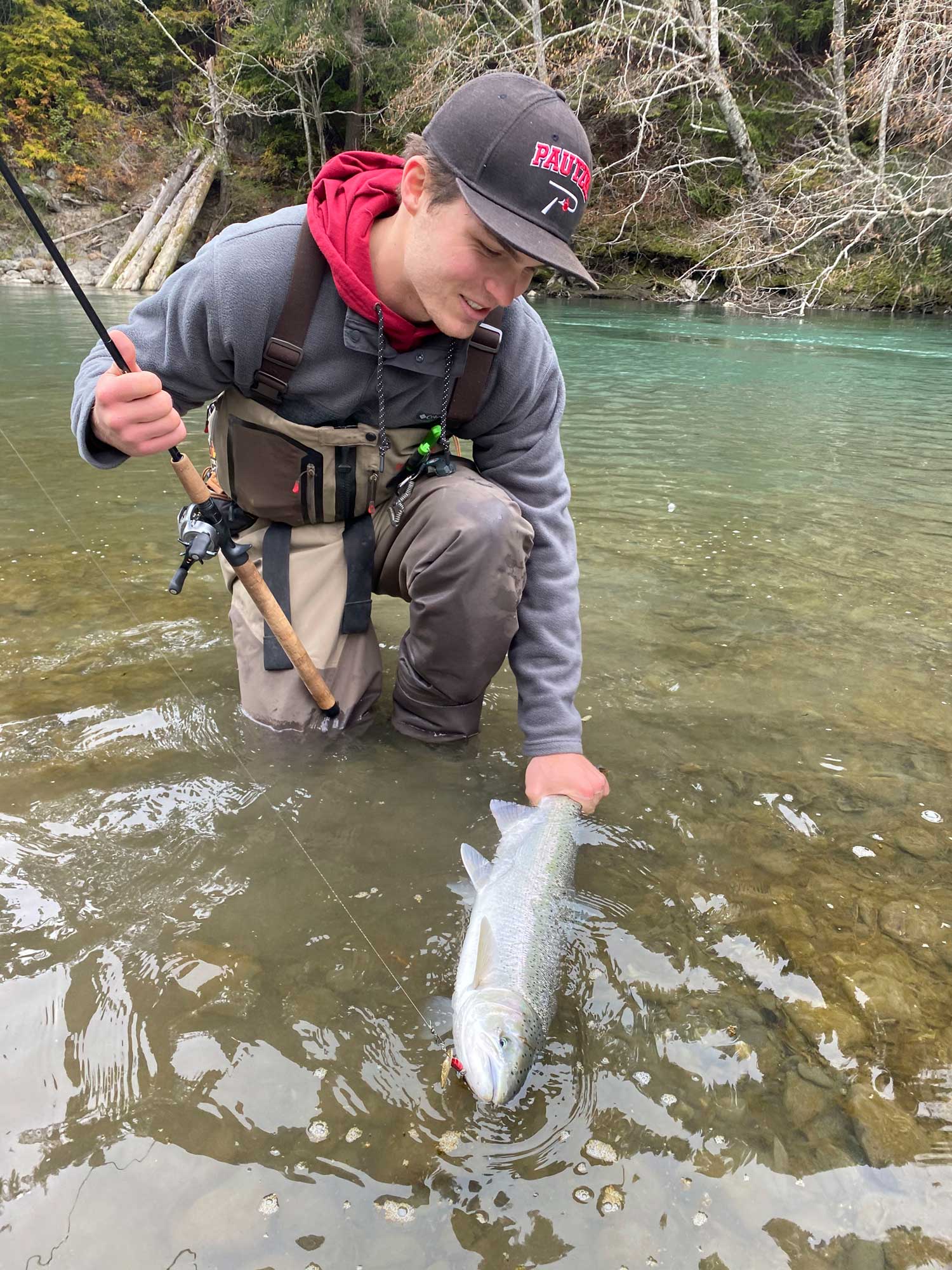
Vinnie Baroga
Received: 2022
It is a true honor to receive the 2022 Michael G. Scott Award. Mr. Scott made incredible contributions to both our country's freedom and the environment and I am enamored to be related to his legacy in this way. This accolade would not be possible without the support of my friends, family, and faculty that have pushed me to be the absolute best version of myself over the last four years at Cal Poly Humboldt. Five years ago, I had no idea that Cal Poly Humboldt and the Fisheries Biology program even existed. As an avid salmon and steelhead angler growing up in Washington State, working with the conservation of these species has always been a dream of mine. The discovery of Cal Poly Humboldt opened my eyes to the world of Fisheries Biology and the science that encompasses it. Out of all of my great memories and experiences I have acquired over the last four years, the thing I value most about the Fisheries Biology program is the passion of our professors and faculty. Throughout the course of my education, every fisheries professor I had made an effort to assist me in one way or another. The Fisheries Biology program is led by some truly incredible individuals that are passionate about their jobs and sincerely care about the future and well-being of their students. Another aspect of the Fisheries Biology program that I appreciate is the companionship that comes along with it. Many of my current best friends are also in the Fisheries Biology program, and being surrounded by individuals with the same goals and passions as myself has been monumental for my academic success.In the future, my dream is to enter the field of Salmonid Conservation. I have been working at Taylor Shellfish for the past year, gaining hands-on real-world experience in the aquaculture field, and the cultivation of shellfish is also something I hope to be a part of in the future. I hope to do some level of international work in my future to gain experience with global diversity in the fisheries field. For me, as long as I truly know I am making a difference in the ecological world, I will be satisfied. When it is all said and done, I am hoping to have extensive experience working as a fisheries biologist in the Alaskan backcountry.2021


Cathy Sandeen
Received: 2021
'76 Speech Communication
Cathy Sandeen (‘76, Speech Communication) is the President of California State University, East Bay. Sandeen earned a Ph.D. in communications from the University of Utah and a Master of Business Administration degree from the UCLA Anderson School of Management. She was named an American Council on Education (ACE) Fellow in 2010-11. Prior to becoming president of CSU East Bay, Sandeen was chancellor of the University of Alaska Anchorage from September 2018-December 2020, and chancellor of the University of Wisconsin Colleges and UW-Extension for four years. Previously, as vice president for education attainment and innovation at the American Council on Education, she led ACE's nationwide effort to increase post-secondary educational attainment. A prolific writer and speaker, Sandeen has published and presented widely on the issues surrounding educational innovation and nontraditional students.


Drew Petersen
Received: 2021
'91 Physical Education
Drew Petersen (‘91, Physical Education) is the strength and conditioning coach for the Humboldt State athletic department. He began the strength and conditioning program at HSU in 1991 and is responsible for the design and implementation of the year round strength and conditioning program for all HSU sports. Petersen has coached 55 strength and conditioning All-Americans and mentored and developed numerous strength and conditioning coaches throughout the years, many of whom have gone on to become Division I, II and III coaches as well as a head NFL strength and conditioning coach.
As a faculty member in the department of Kinesiology, Petersen teaches all of the strength fitness and weight training courses, inspiring students to incorporate concepts of health and fitness into their daily lives.
Petersen is certified by the National Strength and Conditioning Association and United States Weightlifting as a Level 1 Coach. He was recently awarded the NSCA’s CSCS-E, Certified Strength and Conditioning Specialist Emeritus, the highest level of certification in the field with 25+ years of service. In 2015, Petersen was recognized as a finalist for the Collegiate Strength and Conditioning Coach of the Year award at the annual National Strength and Conditioning Association convention.


Heidi Moore-Guynup
Received: 2021
'98, '00 Psychology
Heidi Moore-Guynup (’98, Psychology, ’00 M.A. Psychology) has served students, families, and communities across Humboldt County for over 30 years. She has served as a school counselor, school psychologist, Associate Principal, Principal, Assistant Superintendent, and Superintendent and, most recently, is serving the Blue Lake Rancheria as their Director of Tribal Government and Affairs. She is motivated by the youth she has supported and worked tirelessly to improve outcomes for under-represented and marginalized youth and communities. She is currently able to do this with her efforts in sustainable infrastructure and climate action.
Heidi is a strong advocate for equity and inclusion and is intentional about uplifting others whenever and wherever possible. She is the longest-standing member of the Cal Poly Humboldt President’s Advisor Committee, having served three presidents, has served on the Cal Poly Humboldt Foundation Board, and serves on the College of Professional Studies Advisory Board as well as serves on the College of the Redwood’s President’s Advisory Team. She has also served as the co-lead for the Foundation’s Strategic Planning process, which will help guide and inform current and future Board members. In addition to these volunteer roles, she teaches part-time in Humboldt's Graduate Educational Leadership credential program and is the longest-standing faculty member.
Heidi is also helping to shape a sustainable future by working on offshore wind community benefits, ecological restoration, education, and other resiliency-related efforts. Her time at Cal Poly Humboldt, first as a student and later as a faculty member and volunteer, has helped her to build and foster a network of amazingly dedicated and talented professionals for whom she is eternally grateful.


Lynnette Zelezny
Received: 2021
'79, '81 Psychology
Lynnette Zelezny (‘79, Psychology, ‘81, M.A. Psychology). In 2018 Zelezny made history by becoming the first woman president of California State University Bakersfield. In 2020 Zelezny was recognized as the Robert C. Maxson President of the Year by the California State Student Association (CSSA). In addition to her Psychology degrees from Humboldt State, Zelezny has earned a Ph.D. in Applied Social Psychology from Claremont Graduate University and an M.B.A. with distinction from the Craig School of Business at Fresno State. She has also earned professional certificates in management from Harvard University and in executive leadership from the Wharton School of Business at the University of Pennsylvania.
Prior to joining CSU Bakersfield, Zelezny served for 30 years at Fresno State in roles that included provost, associate provost, dean and associate vice president in continuing and global education, associate dean for the campus’s Craig School of Business, and chair of the psychology department. Zelezny has served as a visiting professor at the University of Stockholm in Sweden, an American Council of Education Fellow at Towson University in Maryland, and as a Fulbright Scholar in Germany. An applied social psychologist, Zelezny has published research related to the environment, health, leadership, and student success for underrepresented students.


Richard Casale
Received: 2021
'75 Natural Resources Management
Richard Casale (‘75, Natural Resources Management) has spent more than four decades protecting California’s natural resources and agricultural industry. He worked for the USDA Natural Resources Conservation Service (NRCS) as a district conservationist for 43 years until his retirement in 2017. Following retirement he worked as a NRCS wildfire restoration contractor, assisting California communities recover from devastating wildfires. Casale has served thousands of Californians over his career with their natural resource management needs. He has written numerous technical articles and publications including the soon to be released, “Post-Wildfire Restoration Guide” for NRCS.
Casale is a Certified Professional in Erosion and Sediment Control (CPESC), a certification program he co-founded 40 years ago. Today, there are over 20,000 certified CPESC professionals worldwide. He has received numerous awards including one presented to him in Washington D.C. for pioneering volunteerism in the USDA. In 2017 he was awarded a Natural Environmental Award by the California State Assembly and Lifetime Achievement Award by EnviroCert International, Inc.


Robert Romano
Received: 2021
'95, '96 English
Robert Romano (‘95, English, ‘96, M.A. English) is the co-founder and C.E.O of BookheadEd, featuring the online language arts curriculum StudySync, which develops and publishes English language arts (ELA) curricula and provides multimedia exercises, lessons, and other materials. Today over 3 million students and teachers use StudySync daily.
As CEO, Romano creates the vision for the company, conceptualizing the multimedia elements, and finding unique applications of technology. He also prioritizes the focus for 100 employees—among them are academic, engineering, and marketing experts. In less than 10 years, the company has a major foothold in classrooms across the nation. Adapted to meet national educational standards and state adoptions, StudySync has become the country’s number one core ELA program. In addition to BookedEd, Romano has started four other businesses; EdVantage Software, Global Vineyard Estate, a furniture company, and a real estate company.

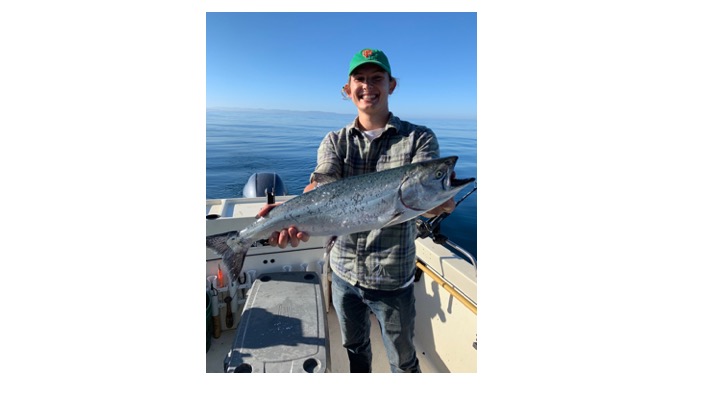
Gavin Bandy
Received: 2021
It is truly an honor and a privilege to receive the Michael G. Scott Outstanding Senior in Fisheries Biology Award. This would not have been possible without the incredible support, encouragement, and knowledge of the Fisheries Department faculty, as well as my fellow classmates, friends, and family. When I first arrived at Cal Poly Humboldt as an undergraduate, I knew I wanted to pursue an education/career in aquatic sciences, however, I was unsure what the next four years would hold for me. The opportunities and experiences I have gained through my course work and technician positions within the department have allowed me to explore the diverse field of Fisheries Biology and what specialization best suited me.
One aspect of the Humboldt Fisheries program that I highly value, is the amount of field experience students can participate in. The diversity of habitats and field settings within Humboldt County, as well as the collaboration between the University and other agencies, is an incredibly unique educational experience and has been instrumental in guiding my educational and career interests. Being able to apply the concepts learned in lecture to practical field settings, is something that has significantly furthered my passion for this field. The atmosphere of Fisheries courses is something I also hold in high regard. The learning environment is one in which you learn fundamental concepts of the field, hear the diverse experiences of the professors, collaborate with both undergraduate and graduate students, and feel a real sense of community amongst the department. Although my degree is in the freshwater emphasis, I have gained an appreciation for all aspects of the field through taking courses and talking with the faculty. Additionally, the emphasis Cal Poly Humboldt puts on understanding the cultural significance and value of Fisheries resources is extremely important for me. It is especially significant for the location of Humboldt, as the field continues to grow and strives to become more inclusive.
The Fisheries Biology Department at Cal Poly Humboldt is one that continually inspires its students to exceed. I am currently continuing my education at Humboldt perusing a Master’s Degree in Dr. Andrew Kinziger’s Lab. My studies will entail developing methodologies to perform local-scale occupancy estimates of Coho Salmon using environmental DNA. In my future career, I hope to work with the restoration of Pacific Salmonid populations and their habitats. Again, I would like to thank the faculty and students at Humboldt, as well as my friends and family, for helping me along my educational journey.
2020


Abby Abinanti
Received: 2020
'70 Journalism
Abby Abinanti (‘70, Journalism) is Chief Judge for the Yurok Tribe, where she is an enrolled member. Abinanti was the first Native American woman to pass the California bar and the first Native American woman in California to become a state judge. She also serves as a Court Commissioner for the City and County of San Francisco, a position she has held for 20 years. During her career, she has taught in law schools including University of California, Berkeley and Stanford University Law School, and has delivered lectures at numerous law schools. Additionally, she served as Chief Counsel to a number of tribes and has served by appointment in various tribal courts, including Hopi and Hoopa.
Known as Judge Abby throughout Indian Country, Abinanti is one of a growing number of tribal judges nationwide incorporating traditional culture into their courtrooms, with the dual aim of rehabilitating individuals and providing justice to people often failed by the regular criminal-justice system. This approach is allowing tribal courts to help realign non-tribal courts as they seek to move away from a criminal justice approach, which has increasingly proven to be unjust.

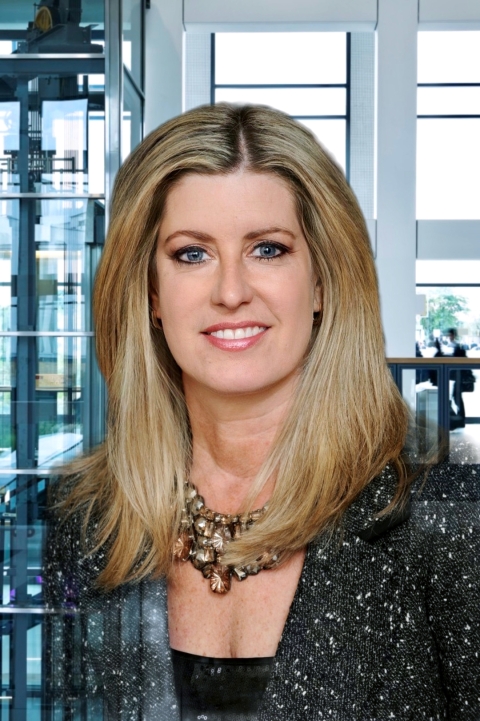
Carin Kaltschmidt
Received: 2020
'90 Computer Information Science
Carin Kaltschmidt (‘90, Computer Information Science) is an Ernst & Young executive who leads professional consulting services for large global corporations. For more than 25 years, she specialized in managing complex business and technology transformations for high tech, media, and entertainment industries. She is a strategic leader that empowers global businesses to innovate their operations, to implement cutting-edge technology and to transform their workforce. She has worked with diverse teams of professionals representing more than 40 countries throughout her career.
She led a crisis management program for Sony Pictures Entertainment following a cybersecurity hack, she managed a global expansion markets program at Cisco Systems to set up new Cisco legal entities in over 30 emerging countries, and headed a team at Disney to launch Disney+ into homes, laptops, tablets, and smartphones across the globe.
Kaltschmidt also established a HSU endowment fund that created an annual scholarship for Computer Science students so they can follow in her footsteps.
View Carin Kaltschmidt's Distinguised Alumni Speaker Series talk
View Carin Kaltschmidt's Distinguised Alumni Speaker Series PowerPoint presentation

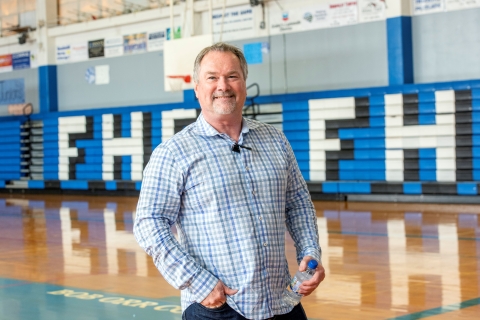
Dan Phillips
Received: 2020
'91 Business, Computer Information Systems
Dan Phillips (‘91, Business and Computer Information Systems) is the Chief Technology Officer at the popular online streaming service Hulu. He is responsible for leading Hulu's technical and product strategy to drive innovation for consumers and partners. Phillips oversees Hulu's entire Technology and Product organization, spanning engineering, data center operations, network and broadcast operations, information technology, and program management, as well as product management, user experience and product development. Phillips has published several papers with NASA and was granted a patent for his work on expanded object models.
In December 2019, Phillips, who grew up in rural Humboldt County, and his wife Cindy, significantly contributed to the HSU community through the creation of the Dan & Cindy Phillips Fortuna Scholarship. This scholarship, established with a $250,000 gift from the Phillips, supports Fortuna High School graduates who enroll at HSU either as transfer students from College of the Redwoods or as first-time freshmen.
View Dan's "Humboldt to Hulu" talk here.


Daniel Raleigh
Received: 2020
'81 Chemistry, Mathematics
Daniel Raleigh (’81, Chemistry, Mathematics) is a Professor of Biophysics at University College London and a Professor of Chemistry at Stony Brook University in New York. While earning his Ph.D. in Chemistry at the Massachusetts Institute of Technology he won the prestigious National Science Foundation Predoctoral Fellowship. From there, he had two postdoctoral research appointments, one at Oxford University and the other at Du Pont Merck Company.
His major areas of research are to develop methods to study proteins. He has conducted ground-breaking studies of the role of protein misfolding and aggregation in disease, and his contributions to this area have led to a new view of the critical unfolded state of proteins. The misfolding and pathological aggregation of proteins is the direct cause of more than 20 devastating human diseases, including Alzheimer’s disease, cystic fibrosis, Parkinson’s disease, and ALS, and contributes to type-2 diabetes.
Raleigh’s achievements have been recognized by a National Science Foundation Career Award, selection as a Pew Scholar in the Biomedical Sciences, membership on the editorial boards of five leading journals, selection as a Wellcome Trust Senior Investigator, and most recently by membership in the National Academy of Inventors.


Forest Stearns
Received: 2020
'05 Art
Forest Stearns arrived in the legendary Humboldt County in 2002, passionately searching for creative opportunities larger than his small hometown could provide. In search of empirical and academic education, he met like-minded creatives and Co-Founded the beloved Empire Squared art group. The vivacious Empire Squared community of diverse artists created their own art scene and produced many years of continuous monthly art shows throughout the Emerald Triangle.
Stearns attended Humboldt State from 03-05 where the Fine Art academic conversation battled the Lowbrow urban folk art scene that Empire Squared and fellow communities were re-amplifying. Often head on, this contrasting dialog between traditional arts education and the guerilla art movement constantly created interesting and necessary friction and drama on all sides of the insulated community. With daily practice, Empire Squared took bold leaps and always yearned to innovate on unusual partnerships. This was seen as excitingly contemporary or even obnoxious. Either way the goal was to get noticed, learn from each other, and challenge the community in new ways.
While in Humboldt County, Stearns graduated his committed moniker of "DRAWEVERYWHERE" into a full fledged art studio of the same name. Diving into every opportunity to collaborate with a diverse clientele and always pushing the envelope of where art can be applied. Launching his career from 707 and changing lanes from the saturated Fine Art world, Stearns relocated to the Bay Area for an MFA in Illustration.
In 2012, the DRAWEVERYWHERE offering was again remixed to include more community relations into his illuminated practice. Believing in the power of unique and unusual partnerships, Stearns began founding and directing Artist in Residence programs with a passion for creative collaborations connecting artists to the worlds of science, and technology. He upgraded the studio to an Oakland based LLC where he and his creative studio community produce unique artwork for a wild and wide range of innovative projects. The artistic imprint can be found all over the globe and has been commissioned by companies such as Deviant Art, Apple, Netflix, Adobe, and Planet.
Stearns created the first art show in space at aerospace firm Planet Labs in San Francisco. From 2013-18, as founder of a robust Artist in Residence program, he created large scale illustrations and helped engineer the process for laser etching each art piece onto multiple surfaces of more than 350 satellites launched into Earth’s orbit. See more on this creative adventure on the artists TEDx talk "Space Art Dream Remix."
Currently Stearns is the Principal Artist and co-founder of the Artist in Residence program at the Google AI Quantum project in Santa Barbara, where he continues to push the envelope of art production in size and media. From rocket ships and quantum computers to endless sketchbooks and fine art exhibits, the artistic portfolio is diverse in media and substrate but always aligns with the constant practice of DRAWEVERYWHERE.
View Forest's Distinguished Alumni Speaker Series talk here.

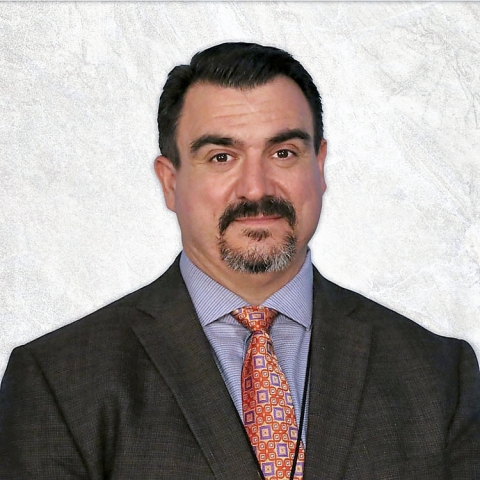
Jason Ramos
Received: 2020
98, '14 Kinesiology
Jason Ramos (‘98, Kinesiology, ‘14 M.S. Kinesiology) serves as a tribal council member for Blue Lake Rancheria and chairman of the BLR Gaming Commission. Ramos works to advance tribal strategy, policy, programs, and investments in infrastructure and economic enterprise, and collaborates with tribes, federal, state, and local governments, and other agencies. His contributions have strengthened tribal sovereignty, improved education, accelerated climate action, and spurred economic development.
Ramos also serves on the U.S. Department of Energy Indian Country Energy and Infrastructure Working Group, the Northern California Tribal Chairperson’s Association, the Tribal-State of California Regulators Association, and Blue Lake Education Foundation. His work for BLR has earned the following recognition: a 2019 “Green Power Leadership Award” from the Environmental Protection Agency; 2019 “Microgrids for Greater Good Award” from Microgrid Knowledge; 2018 “Project of the Year for DER Integration” from POWERGRID International and DistribuTECH; 2017 “Whole Community Preparedness Award” from FEMA; and the 2015-2016 “Climate Action Champion” from the White House and U.S. Department of Energy.
Ramos also has a deep commitment to Humboldt State. He currently serves on the President’s Native American Advisory Council, Sponsored Programs Foundation Board of Directors, and the new Masters of Business Administration Program Advisory Board. He previously served on the HSU Foundation Board of Directors, including a tenure as board chair, and the Alumni Association Board of Directors. He continues to support Kinesiology through The Jason M. Ramos Endowment for Kinesiology Research, which funds equipment and research for the Biomechanics and Human Performance labs on campus.

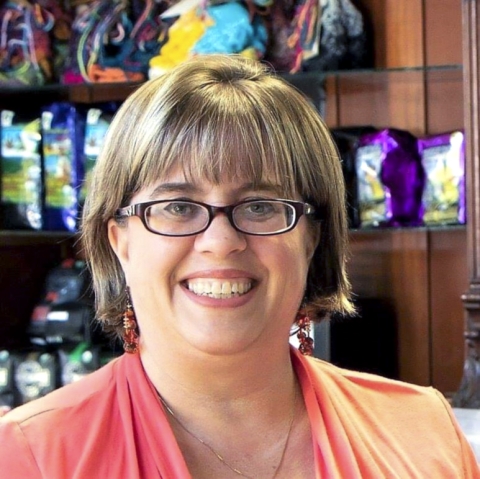
Susan Seaman
Received: 2020
'96 Journalism
Susan Seaman (‘96, Journalism) is the mayor of Eureka and program director for Arcata Economic Development Corporation (AEDC). After graduating, she worked as the Program Information Director for KEET-TV for 15years, developing promotional materials, planning events, producing television shows and developing outreach programs to support children's programming. For a few years, she and her husband owned a small market in Fieldbrook, where she developed an interest in the role of small business in the community. She started working for AEDC to promote small business and economic growth. After three years serving on the City of Eureka's Economic Development Commission, she ran for mayor and won in 2018.
Under her leadership, Seaman introduced the Eureka Family and Children Initiative. This initial five-year plan will focus on making Eureka a more supportive environment for families and young children.
Besides sitting on boards and advisory committees, including HSU’s Center for Community Based Learning and MBA Advisory Group, she volunteers with community projects. Currently, she is a Big Sister of a 17-year-old in the North Coast Big Brothers Big Sisters program. She also delivers food to seniors through Food for People’s Senior Brown Bag Program.

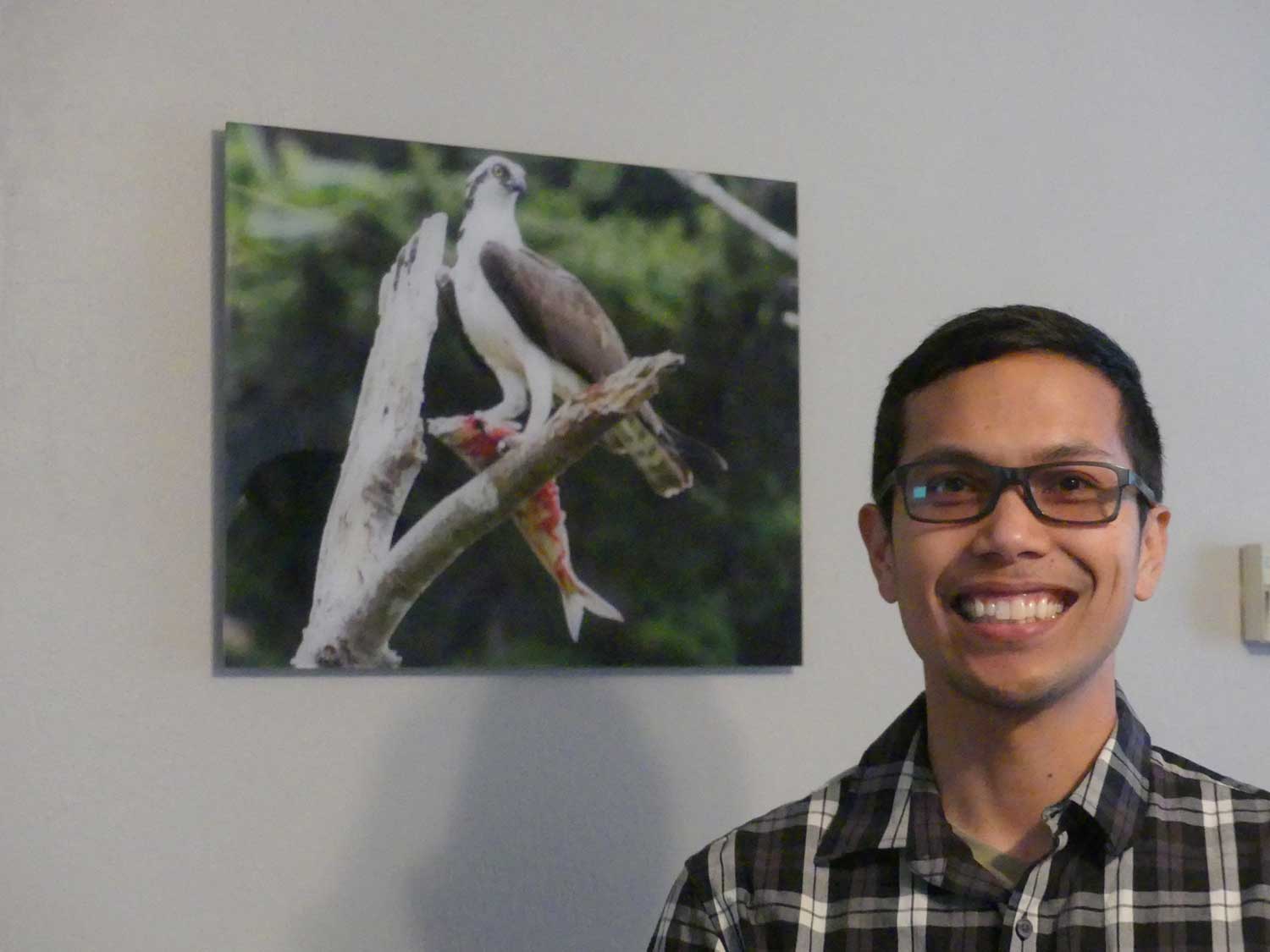
Michael Academia
Received: 2020
In honor of Michael G. Scott, we must remember the importance of our academic lineage and I am proud to be a part of it. Our reputation has earned respect and is held in high regard throughout professional and scholastic communities. With the professors and staff, I was able to achieve much during my time as an undergraduate, that included a $65,000 grant that will replace an outdated water recirculation system at our on-campus hatchery. Thus, ensuring future students with unique opportunities and learning experiences as one of the only universities with a fish hatchery. The professors took the time, effort, and were dedicated to my success as I published a peer-reviewed scientific article in Western Birds between predator-prey relationships, specifically ospreys and the fish they eat. With significant findings, I presented my research at three major conferences including The First AFS & TWS Joint Conference (American Fisheries Society & The Wildlife Society)./p>
As leaders in our field, we are taught the importance of adaptive management and I am building the bridge between Ornithology and Fisheries Science. We are shifting the paradigm, considering trophic interactions other than our own, and moving towards Ecosystem Based Fisheries Management. I plan to continue my studies of ospreys as biomonitors of fisheries and aquatic health while pursuing a graduate degree.

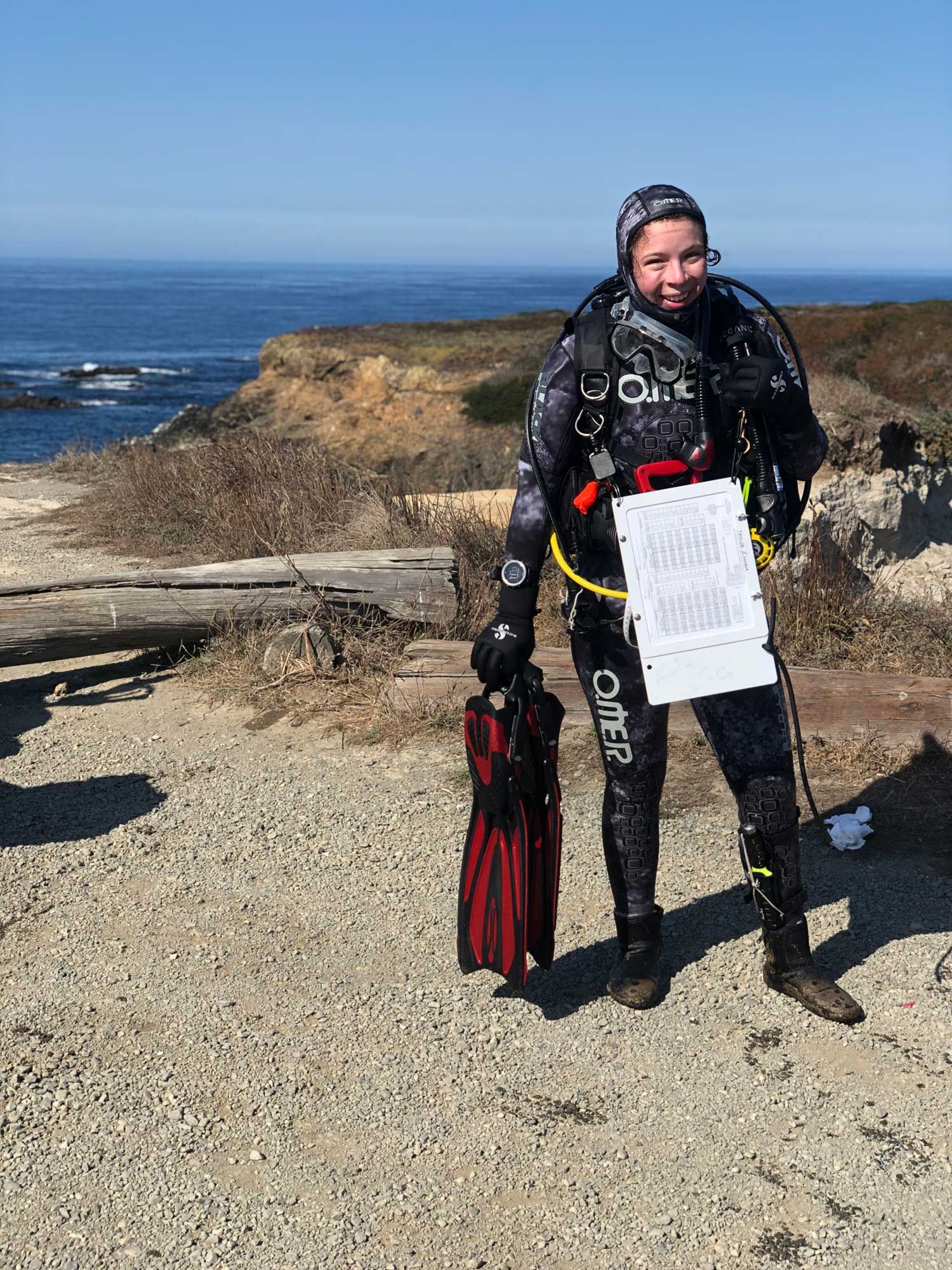
Taylor Zenobia
Received: 2020
Fish hold incredible cultural, economic, nutritional, and political value. As a student within the fisheries biology program, I have learned that by focusing on fish we have the power to impact our environment, our society, and protect our world for future generations. The faculty, staff, and students within the fisheries biology program hold each other to a high standard that is recognized in the professional fields I have participated in as an undergraduate student. As leaders in our field, I find it incredibly important to bring my personal perspective and experience to the material that I am acquiring and using that to question the origin of these ideas. The faculty within the department has responded to my queries by allowing me the opportunity to collaborate with my peers, specialists in the field, graduate students, and people in other majors. This has resulted in broadening my perspectives and creating new knowledge by coming together with others and incorporating multiple perspectives into paradigm shifts. As a student I have also had the unique opportunity to double minor in Scientific Scuba Diving and Women's Studies. These other curricula have given me the hands-on knowledge of what it's like to be a scientist underwater, counting hundreds of fish as they swim by, and to learn critical theory about how oppression is structured into our society and our experiences. By incorporating all of these knowledge bases I have found myself to be a better scientist overall and a more responsible global citizen. I have grown most as a student and scientific researcher from the unique hands-on opportunities offered by the faculty and supported by the staff at the marine laboratory to conduct independent undergraduate research and present my findings at globally recognized conferences. My current research has focused on the integrated culture of macroalgae with the sustainable production of other trophic level organisms and the implementation of addressing social problems such as gender inequality, environmental classism, and global food insecurity within scientific research. I completed three independent projects and was awarded best student abstract by the United States Aquaculture Society and the World Aquaculture Society in 2019. I was also awarded the best student oral presenter at the Aquaculture America conference in 2020 for my research on reducing the electric energy requirements for land-based macroalgae aquaculture systems. My future career plans include continuing my education in graduate studies at Cal Poly Humboldt; this will entail studying the population dynamics of the Galapagos Ocean Whitefish. I hope to eventually go on to complete a PhD program to help reduce the impacts of food insecurity across the world.
2019


Lisa William
Received: 2019
'92 '96 Journalism, English (Education)
Lisa William (’92, Journalism, ’96, English (Education)) is a professor at California State University, Sacramento and San Joaquin Delta College. Lisa teaches more than nine courses a semester while maintaining a very active service and publication record. Lisa has authored and co-authored nearly 25 academic journals, articles, book chapters and other publications.
Each semester, she teaches popular courses on topics like Urban education, discourse on race and gender in educational settings, and social and psychological foundations of multicultural education. Lisa is committed to improving opportunities for all her students. She has served as a mentor in the CSUS Pathways Fellows program, advisor for the CSUS McNair Scholars, and co-advisor for the CSUS Graduate Education Student Association.
Lisa is the 2018-2019 recipient of the CSUS College of Education Outstanding Teaching Award, the 2012 UC Davis Distinguished Alumni Award, the 2006 International Society for Exploring Teaching and Learning Distinguished Fellows Presentation Award, and the 1999 Sacramento City Unified School District Teacher of the Month.


Mike Radenbaugh & Ty Collins
Received: 2019
'12 '10 Industrial Technology, Journalism
Mike Radenbaugh (’12, Industrial Technology) and Ty Collins (’10, Journalism) are two of the co-founders of Rad Power Bikes, North America’s largest electric bike company. They make electric bikes that are accessible, affordable, and appealing to the masses, and continue to pioneer the world of sustainable transportation. Rad Power Bikes intentionally forgoes the traditional bicycle distribution channel of third-party dealers and retailers, enabling them to provide customers with premium ebikes for almost half the cost of comparable models, while building a closer relationship with the rider.
Mike built his first ebike in 2007 as a way to get to school without breaking a sweat. His “frankenbikes” quickly caught the attention of his small town, and he started building ebikes for friends, family, and neighbors. Today Mike and Ty employ a team of nearly 100 with headquarters in Seattle, Washington, Vancouver, British Columbia and Utrecht, Netherlands. Mike and Ty have been named to Forbes and Inc. Magazine’s “30 Under 30” lists, and Seattle’s Puget Sound Business Journal’s “40 Under 40” list.

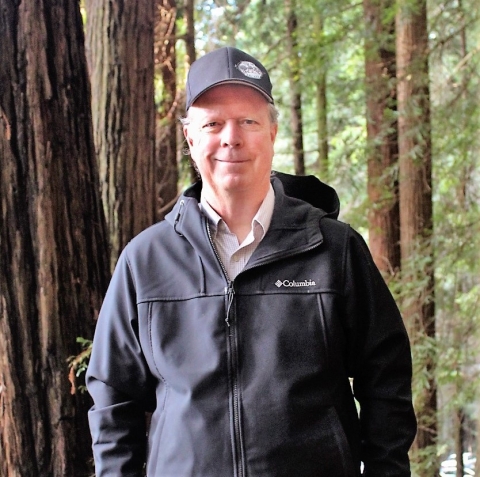
Mark Andre
Received: 2019
79 Natural Resources Planning & Interpretation
Mark Andre (’79, Natural Resources Planning & Interpretation) is the Director of Environmental Services for the City of Arcata and a registered Professional Forester. In this role, Mark overseas Arcata’s environmental programs, natural resources, parks and recreation, community forest, wildlife areas, and public utilities. Mark manages an annual budget of $19 million and a staff of 40 full-time and 50 part-time employees. Because of Mark’s efforts the Arcata Community Forest, established in 1955, has grown considerably. He has worked closely with Humboldt State to allow use of the forest not just for field trips but also for research by faculty and students. The forest is nationally considered as a model community forest.
Mark recently helped lead the acquisition of 967 acres of public forest in the Jacoby Creek watershed, of which 884 acres will be given to HSU. Mark worked to secure a $1.7 million donation from the property owner (R.H. Emmerson & Son) and grant funds from several sources, including $1.75 million from the California Department of Fish and Wildlife, $800,000 from CAL FIRE Climate Investment Fund, $230,000 from the California Resources Agency, $1.72 million from the Wildlife Conservation Board, and $45,000 from the US Fish and Wildlife Service.
Mark was appointed to the California board of Forestry by Governor Arnold Schwarzenegger in 2010 and reappointed to additional terms by Governor Edmund G. Brown Jr. He was recently recognized by the California State Assembly with a resolution recognizing his nine years of service to the Board including his work on the State Forest Carbon Plan and leadership working on forest practices regulations.

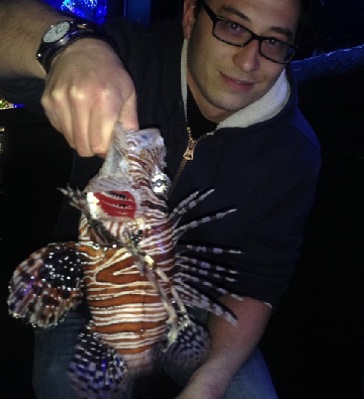
Josh Cahill
Received: 2019
I am truly flattered and honored to receive the Michael G. Scott Award, but I would have been unable to succeed without the support and encouragement of the fisheries biology faculty, my fellow classmates, and my family. Balancing family duties and academic responsibilities was a difficult undertaking. With my wife’s inspiration, I returned to college as a 36 year-old aquarium nerd/ex-construction worker that had never used PowerPoint or Excel. I only possessed the desire to absorb as much piscine knowledge as humanly possible. Reflecting on my time spent at Cal Poly Humboldt, I realize that the element of the fisheries biology program that I hold in highest regard is the dedication of the department to ensure students’ academic and professional success in the field of fisheries biology.
I was allured to the fisheries biology program at Cal Poly Humboldt because of the amount of fieldwork that aspiring fish biologists are exposed to. In my opinion, the hands-on aspect of the program combined with the classroom curriculum offers a more vocational degree than other biological sciences. The individual disciplinary expertise offered by all professors during their course fieldwork was enlightening and invaluable. The fisheries biology staff and faculty also offered opportunities for undergraduate student success through project opportunities, volunteer hours on and off campus (e.g. at the hatchery, marine lab, and aquaponics facility), job and internship emails, and assisting graduate students with their research. On a more personal note, each professor in the department had been supportive and willing to help in various capacities at different times throughout my college career.
The fisheries biology program at Cal Poly Humboldt delivered beyond my expectations, and my time spent in the department was a rewarding experience. As my education progressed in this diverse, multi-disciplinary field, I began to realize that different fisheries course contents built upon and complimented one another. While I have earned a bachelor’s degree in fisheries biology, I feel as though I have merely scratched the surface. I hope to return to Cal Poly Humboldt in the fall to pursue a master’s degree in fisheries biology, and plan to work as a fisheries biologist focused on restoration of salmonids and their habitat.
2018


Corey Gray
Received: 2018
‘97 , Physics & Applied Mathematics
A member of the Siksika Nation (Northern Blackfoot) of Alberta, Corey Gray (‘97, Physics & Applied Mathematics) currently supervises the operator crew for the Laser Interferometer Gravitational-Wave Observatory (LIGO) in Washington, where he’s worked since 1998. He was part of a team that directly detected gravitational waves from the collision of two black holes 1.3 billion light years away. The discovery, which supports Albert Einstein’s General Theory of Relativity, won the Nobel Prize in Physics in 2017.
As an HSU student he was an active member of the Indian Natural Resource Science & Engineering Program (INRSEP), American Indian Alliance, and HSU Student Drum. Through INRSEP, he made a deep connection with his heritage. “I really appreciated the opportunity to learn about my Native background,” Gray says.
His commitment to community continues today. Recognizing the need to recruit Native American youth into STEM fields, he serves as a positive role model for underrepresented youth. He also recruited his mother, Sharon Yellowfly, to translate LIGO press releases into the Blackfoot language. He is an active member of the American Indian Science and Engineering Society, and the Society for Advancement of Chicanos/Hispanics, and Native Americans in Science.


Jennifer Kho
Received: 2018
'99 , Journalism
The managing editor of the HuffPost, Jennifer Kho (‘99, Journalism) has made her mark in journalism not only as a reporter and editor, but also as a newsroom leader for major media publications throughout the country.
After graduating from Humboldt State, Kho received a master’s degree in journalism from UC Berkeley in 2003. She became a staff writer for the Los Angeles Times’ community newspapers and the Fremont Argus in the San Francisco Bay Area. She covered the tech world for Red Herring magazine and was the founding editor of the sustainable business site, Greentech Media. Her writing and photography also has appeared in The New York Times, The Wall Street Journal, and Forbes.com.
She became the managing editor of the Guardian US from 2015 to 2017. During her tenure, she guided the online publication through an increasingly difficult media landscape in the United States. She helped foreign correspondents deal with death threats, created ethical and journalistic standards, and helped investigate a freelancer suspected of fabricating stories.
The skills she gained at HSU have helped her become a major player in U.S. journalism and she is an inspiration to current and future journalism students.


Eliberto “Eddie” Ramos
Received: 2018
'99 , Sociology
Eliberto “Eddie” Ramos is a Psychiatric Social Worker for Los Angeles County Department of Mental Health Court Linkage Program within superior courts. Serving as a bridge between the courts, the community, and the clients within the Los Angeles criminal justice system, he works on alternative sentencing and rehabilitation plans for adult offenders. He has helped community organizations develop and implement prevention and intervention strategies that target at- or high-risk adolescent populations to reduce community violence. His knowledge and effectiveness in his fields has led to numerous invitations as a presenter and keynote speaker at colleges, universities, and conferences.
His dedication to community service carries into his personal life through the years he worked for the R.M. Pyles Boys Camp, a wilderness camp promoting leadership and character development for low-income, disadvantaged boys. Ramos, who attended the camp as a youth, and is now on the board of directors, credits it with helping him on the path to HSU. “I just want to find ways, either through interventions, camp programs or rehabilitation to help preserve young adolescent lives.”


Tim Rine
Received: 2018
'97 , Business Administration
Tim Rine is the executive director of the North Coast Clinics Network (NCCN), a consortium of community health centers that support vulnerable and underserved residents in Humboldt, Del Norte, and Trinity counties. Under Rine’s leadership, NCCN became a recognized leader in California for its regional coordination of quality rural health care.
Rine has secured more than $12 million in funding to help improve health care access and outcomes in the region. Rine facilitated a County Organized Health System model for managed care—a move that brought in millions of new health care dollars in the community. Rine says HSU fostered his commitment to serving the community’s vulnerable population through the healthcare system. “My experience at Humboldt State University was instrumental in laying the foundation for exploring an early career in rural health care and social justice.”


Craig Tucker
Received: 2018
'74 , Zoology
Craig Tucker (’74, Zoology) is recognized as a leader in warmwater aquaculture and is considered by many as the father of the catfish industry. His career has focused on farming North American catfishes, considered the largest and most important aquaculture sector in the country and a critical economic development activity in the rural southeastern region. His work addresses improving farm efficiency and managing the environmental impacts of farming activities.
In 1980 he became the first scientist in Mississippi State University’s aquaculture research program. Tucker’s research helped the catfish industry grow from a local farming activity to the largest producer of cultured seafood in the United States.
Tucker has authored or co-authored nine books and more than 100 peer-reviewed papers. Tucker, who retired from MSU in 2012, feels that his time at HSU prepared him for this journey. “Attending an intimate, teaching-focused college seems to give people social skills, confidence, and a way of learning that serves them throughout life.” Since retirement, Tucker has been serving as the lead researcher for the USDA-ARS Warmwater Aquaculture Research Unit. In 2017 he was named a Fellow of the World Aquaculture Society and was recognized as Alumnus of the Year for the Auburn University College of Agriculture.


Brandie Wilson
Received: 2018
'09 , Sociology, ’11, M.A. Sociology
Brandie Wilson is founder and executive director of the Humboldt Area Center for Harm Reduction (HACHR). The nonprofit seeks to improve Humboldt County’s overall rating on the Healthy Communities Index, which includes overdose deaths, mental illness, suicide, and homelessness rates.
Through HACHR, Wilson works to provide critical services and programs. She started the successful Syringe Exchange Program, which serves hundreds of consumers each week, ensuring the life-saving drug Naloxone is distributed throughout Northern California with training on how to administer the drug and reverse an overdose, and created an Overdose Awareness Day of education and action.
Wilson was the first to notice a disturbing local trend: methamphetamine laced with the dangerous narcotic fentanyl. Wilson quickly began educating those who use drugs on the danger, saving even more lives. She also created a system to test drugs for the presence of fentanyl, which is fueling an opioid crisis in California and across the country.

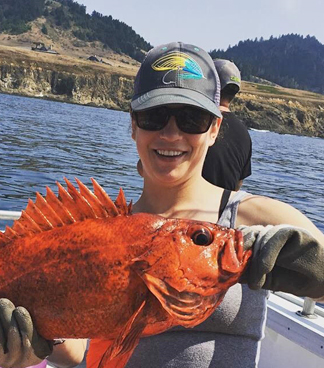
Ashley Kay
Received: 2018
It is with much gratitude that I receive the Michael G. Scott Award. I largely owe my drive to succeed in the Fisheries program to all of the incredibly supportive, passionate, and knowledgeable professors and faculty. Being located in such a beautiful landscape and surrounded by so many opportunities to receive diverse hands-on experiences in natural settings has been instrumental to deepening my love for this field. I am so appreciative for the time spent outdoors during lab sessions and the wide variety of fisheries techniques that I was able to learn and utilize outside of a classroom setting. I will always remember how my professors so strongly wanted their students to succeed and would do anything within their power to provide the help and resources to make this happen.
While I received my degree with a Freshwater emphasis, I have developed a very solid appreciation for the marine side of the field and for this I almost entirely have Dr. Tim Mulligan to thank. His Ecology of Marine Fishes class combined with his palpable excitement and passion for the subject sparked a similar excitement in me that I did not previously realize existed. This, combined with the opportunities and connections to secure ever-valuable internships, led to me acquiring a position as a Fisheries Observer with Alaskan Observers. I am fortunate to have been stationed here in Humboldt so I can continue to immerse myself in the setting that helped cultivate my appreciation of the marine realm. At some point in the future I hope to have the opportunity to be involved with work on the rivers again, but for now I am going to savor the amazing experience of being at sea!
My sincerest thanks go out to the amazing staff at Humboldt and all of my hardworking, supportive peers.
2017


Kellie Johnson
Received: 2017
'93 , Political Science
Having served most recently as assistant disciplinary counsel at the Oregon State Bar, Kellie Johnson has had a long career fighting for social justice and equality.
After earning her Juris Doctorate from the University of Oregon and finishing her clerkship, Kellie Johnson spent 13 years as a prosecutor for the Multnomah County District Attorney’s Office (Oregon), specializing in domestic violence and gang crimes. Her work was noticed, and led to her current position at the Oregon State Bar.
She drew upon the strength and character of her mother and grandmother in pursuing academic excellence at HSU, where she was a top student in the Department of Political Science. She was also an exchange student at Guangxi University in China.
Kellie ensures she gives back to her community by serving on numerous boards, associations, and advisory committees. Her goals are to advance diversity and inclusion in the legal community and the criminal justice system. She’s also a frequent lecturer to national and regional audiences, focusing her talks on criminal law, trial practice, and lawyer ethics. Kellie is also a recipient of the Judge Mercedes Deiz award for her work in advancing minorities and women in the legal profession.


Michael T. Rains
Received: 2017
’68 , Forestry Management, ’71 Watershed Management
A widely respected leader in linking environmental health with community stability, Michael Rains led a career that spanned nearly half a century with the U.S. Department of Agriculture’s Forest Service.
Michael rose through the ranks of the Forest Service to become a deputy chief after starting his career as a wildland forest firefighter in the ‘60s.
Leadership and a determination to advance land management were hallmarks of Michael’s work, along with a passion for improving the lives of people in both rural and urban areas. He retired from the Forest Service in 2016 after several accomplishments, including serving as the agency’s lead on developing the National Fire Plan, and working closely on the Living Memorial Project dedicated to the events of Sept. 11, 2001.
Along the way, Michael earned a Master of Education and now teaches math and science to middle school students in Pennsylvania. He’s also a 2012 recipient of the Presidential Rank Award, which honors high-performing federal employees for extraordinary accomplishment. He remains a registered professional forester in California.


Ken Pimlott
Received: 2017
'88 , Forest Resource Management
Ken Pimlott is currently the director of the California Department of Forestry and Fire Protection, the highlight of a career that began 33 years ago as a reserve firefighter in Contra Costa County, California.
Ken is highly focused on the protection of citizens and natural resources. He has championed local control of fire prevention through fuels management, land recovery, and reforestation. Throughout his career, Ken has focused on gaining broad experience in all areas of fire management, including command and control, cooperative fire protection programs, training, and safety.
In the face of historic droughts and a dramatic increase in the occurrence of massive wildfires, Ken has been able to leverage cooperation and integration among federal, state, and local firefighters. In 2016, he was recognized with the California State Association of Counties Distinguished Service Award.

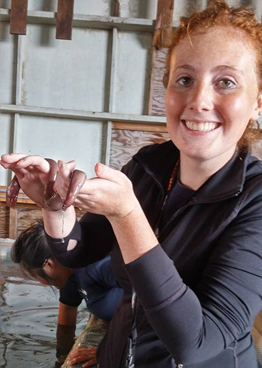
Kaitlyn O’Brien
Received: 2017
I am honored to have received the Michael G. Scott award. I am truly thankful to all the excellent professors, faculty, and fellow students of the Cal Poly Humboldt Fisheries Department. The sense of community in this department made my college experience more enjoyable and made California less frightening for a Colorado native.
While I have many wonderful memories of my time at Humboldt, two major attributes of this program have shaped me as a student and a hopeful fisheries scientist. One was the diversity of classes offered in the marine fisheries program. As a freshman, I was determined to work only on the biology and ecology of fishes, but a multitude of courses, particularly Dr. Andre Buchheister’s Fisheries Population Dynamics course, helped me realize the importance of understanding and analyzing the bigger picture. The classes here helped me discover passions that would have been unknown without the aid of the distinguished fisheries faculty. The second experience that shaped my time here was my work outside the classroom on the Marine Protect Areas of northern California. Thanks to Dr. Timothy Mulligan and a multitude of amazing graduate students I assisted on two MPA projects and gained valuable field experience. Not only did this time working on the MPA help solidify my love of field work, but it also furthered my understanding of statistical data analysis and prompted my first conference presentation at the American Fisheries Society Conference in the spring of 2017.
For my immediate future, I am happy to announce that I will be continuing my education at the Virginia Institute of Marine Science and fulfilling my childhood dream of working with sharks as I will be assessing data limited chondrichthian stocks along the Atlantic coast. I hope to one day work for a federal organization, such as the National Marine Fisheries Services, on the protection and monitoring of valuable commercial and recreational species. I could not be more appreciative to the Humboldt Fisheries Department for the experiences and knowledge bestowed on me in my four years here. I truly do not know where I would be without this great community!
2016


Greg Beck
Received: 2016
'94 , Environmental Engineering
Director of Integrated Development, FHI 360
After volunteering for the Peace Corps in Nepal, Greg Beck continued his education in the International Development track of the Environmental Resources Engineering graduate program.
Currently, Beck is FHI 360’s Director of Integrated Development where he leads a corporate initiative to generate evidence and foster global learning on integrated development solutions.
Before joining FHI 360, Beck served in the Obama Administration as Deputy Assistant Administrator in the Asia Bureau for the U.S. Agency for International Development (USAID), where he managed more than $2 billion in funding for development programming and policy in East Asia and the Pacific. Additionally, Beck presided over the reopening of the Burma (Myanmar) mission after a 24-year closure and chaired the U.S. government’s interagency committee that planned and launched President Barack Obama’s Partnership for Growth in the Philippines.
Beck also brings many years of field and senior leadership experience from the International Rescue Committee, Community Housing Foundation, USAID’s Office of Transitional Initiatives and the Peace Corps that he speaks to in his recent TEDx talk. He has worked in Africa, the Caucasus, Asia and the Balkans and led large emergency responses around the globe.
Beck has a bachelor’s degree in Foreign Service and International Politics from Penn State University.

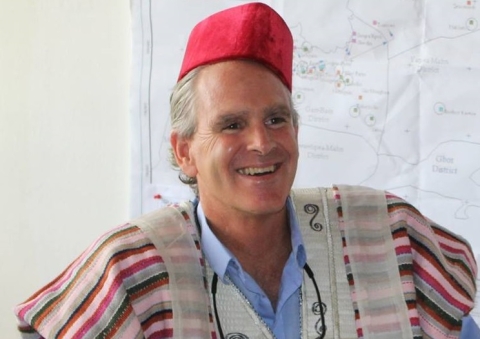
Piet deVries
Received: 2016
'93 , Environmental Systems
Senior Technical Advisor, Global Communities
Piet deVries has led a country-wide response to the Ebola crisis in Liberia. There, he oversaw operations in the countries 15 counties, established improved hygiene and sanitation practices, and paved the way for dignified burials that respected the wishes of the deceased’s families and prevented the human-to-human transmission of the deadly virus.
It’s the greatest challenge deVries has faced, he says, and that’s after a career that has taken him to Thailand, Pakistan, Kosovo, and a host of other countries.
Currently, deVries is the senior technical advisor for the Global Communities’ Improved Water, Sanitation, and Hygiene (IWASH) program. Global Communities is an international nonprofit that works to improve the lives and livelihoods of the vulnerable worldwide. In response to the Ebola outbreak, IWASH evolved into the Assisting Liberians with Education to Reduce Transmission (ALERT) program, both of which receive funding from the U.S. Agency for International Development. deVries credits the success of the program to a focus on establishing trust and connections with the communities where he worked. deVries is originally from Aptos, Calif.

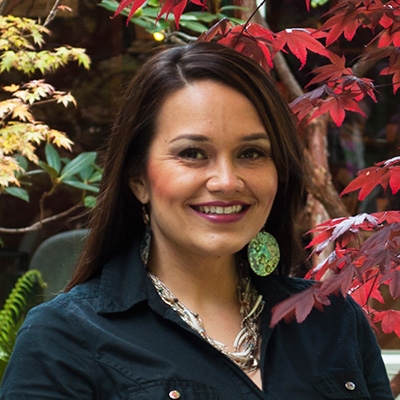
Heather Hostler
Received: 2016
'12 , Native American Studies
Chief Deputy, Calif. Office of the Tribal Advisor
As the Chief Deputy Tribal Advisor to Calif. Gov. Jerry Brown, Heather Hostler is motivated to improve the Native American communities throughout the state. In her role in Sacramento, Heather works with state agencies and tribal governments to strengthen communication and collaboration. Her work includes reviewing legislation, consulting on policy development, coordinating drought responses on tribal lands, and much more.
Heather has long been involved in leadership, serving as the president of the Indian Tribal & Educational Personnel Program at HSU and working with the Humboldt Area Foundation as a program director developing scholarship funds to send Native students to college. Heather is also a member of the Hoopa Valley Tribe.


Phillip C. Humphreys
Received: 2016
'91 , Social Work & '93, Social Sciences
Dean of Students, El Camino College Compton Center
Phillip Humphreys is a tireless public servant whose mission is to expand access to education among minority groups that have found the road to college a hard one to travel. Since his first days as a student at HSU, he has been uplifting his peers and fellow students on campus. He served as a peer counselor with the Educational Opportunity Program, and was president of the Black Student Union. Humphreys was instrumental in helping HSU establish the Multi-Cultural Center for students on campus and ensured the University supported the center by having a paid director position.
Today, Humphreys is the dean of student services at the El Camino College Compton Center, overseeing a variety of resources and programs to support students. He has more than 15 years of managerial experience in higher education, administering state and federal programs for students. He has devoted his career to developing, implementing, and managing student support programs for first-generation, low-income, and underrepresented students.
Before joining ECC Compton Center, Humphreys was the director of the Upward Bound Program at California State University, Long Beach (CSULB), and prior to that, he served as director of the Workforce Investment Act (WIA) also at CSULB. From 1997-2002, he was the assistant director of the Education Equity Services Program at CSULB. Humphreys also has social work experience with the Los Angeles Department of Children’s Services’ Youth Intervention Program where he served as an In-home Outreach Counselor.
Humphreys earned an Ed.D. in Organizational Leadership from the University of La Verne.


Burt Nordstrom
Received: 2016
'75 , Physical Education
Vice President of Administrative Affairs, HSU (Ret.)
Humboldt State has been a part of Burt Nordstrom’s life since he was a kid.
He remembers riding his bike to campus to play in the old field house, and occasionally to sneak into the gym for some pick-up basketball. He later chose Humboldt for college.
Despite a tough start that included failing his first writing assignment as a freshman, he thrived as a student, got involved in campus life and student government, and earned his degree. He also enjoyed great success in football and baseball at HSU. He went on to play two years of minor league baseball, and in 1998 was inducted into the University’s Athletics Hall of Fame.
But all of that was just the beginning. After graduating, he went to work with University Center, and ended up spending four decades in various roles at HSU. At UC, he eventually became executive director. Then in 2004, he was tapped to serve as HSU’s Vice President for Advancement, and he helped create HSU’s Advancement Foundation. After “retiring” he returned to serve as Vice President for Administrative Affairs, providing valuable leadership during the challenges of the recession and budget cuts to higher education.
“I received an outstanding education, and had a great experience as a student,” Nordstrom says. “Then I was able to spend my career at HSU doing all the things I enjoyed, and at a place I care about. That is something I will always appreciate.”
Nordstrom has had a hand in countless projects across campus – including the Rec Center, the clock tower, the Library Café, Humboldt Bay Aquatic Center, College Creek Marketplace, numerous classroom upgrades, and significant expansion of the University Center. His focus, he says, always remained on improving the quality of the student experience. When he retired, the University Senate recognized him with a resolution that read in part: “HSU has been blessed to have a person of Burt’s caliber and dedication.”
Always a fan of Lumberjack athletics, Nordstrom continues to volunteer as a radio commentator on the local ESPN affiliate during broadcasts of Lumberjack football games, a role he has relished for more than 25 years. He says he’s proud to give his time to a place that’s been such a big part of his life.

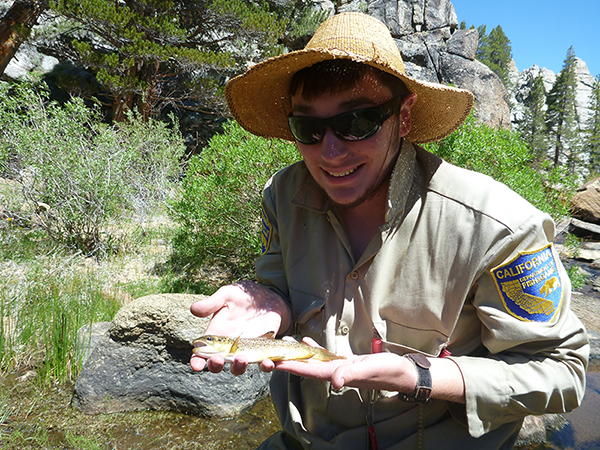
Martin Anderson
Received: 2016
It is an honor to receive the Michael G. Scott Award. I want to express warm thanks to the professors, students and staff of the Cal Poly Humboldt Fisheries program for an excellent undergraduate education. I went to Humboldt with the intention of earning a degree dedicated to the study of fish. I received what I sought and so much more. The advice from professors, fellowship with fisheries students, field experience and career resources make up what I consider to be the most valued aspect of the Fisheries Biology program at Humboldt which is the successful integration of ideas and actions and people. I learned about the concepts and theories of fisheries biology in the classroom with the insights of my professors and peers. These ideas were put into action through the many hands on labs that called for interpretation of the data my classmates and I had worked together on collecting ourselves. Much of what I learned and did with my peers in one class applied to many of my other classes and fisheries career options, creating an interlocking structure of ideas, actions and people that forms a solid undergraduate education.
Thanks to the supportive environment created by the Humboldt Fisheries Biology program, I have sought and held two fisheries internships and a fisheries technician position during my summers as an undergraduate. Right after graduation, I am swimming off for a promising future with the California Heritage and Wild Trout Program, starting out as a scientific aide for them this summer. Graduate studies are still a distinct possibility. Cutthroat trout would likely be the subject of interest in my search for a research assistantship. It is also likely that I will apply to the California Conservation Corps Watershed Stewards project before entering graduate school. In the long term, I would like to continue working with the lesser known species of salmonids as a fisheries biologist for either a government agency or private organization.
Finally I want to thank Michael G. Scott’s family for their appreciation of fisheries students and making distinguished guest speakers available to students heading into the fisheries field to carry on Michael’s work and legacy.

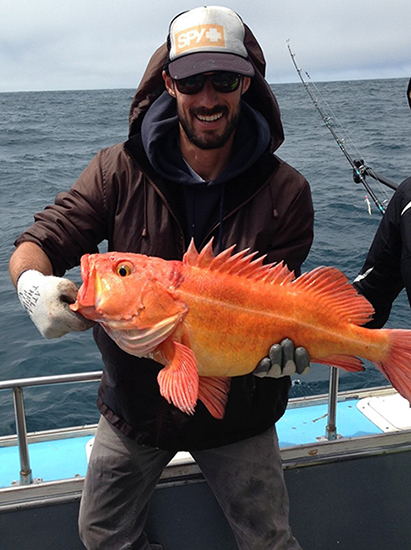
Chad Martel
Received: 2016
My time at Cal Poly Humboldt has included some of the most educational and enjoyable experiences of my life. The ability to work and learn outdoors with fish, has been nothing short of awesome. After thinking about the experience as a whole, what I have come to value most about my time at Humboldt boils down to two things. One, time on the water. This is why I chose the Fishery program at Humboldt, and it is the reason most other student I know came here as well. Being outside, in the mud, the sand, and the water, looking for and at fish. I was lucky enough to secure a position as a tech on number of projects that took me to places in California that I would have never seen or fished on my own. I am thankful to all who made that amazing experience possible; Dr. Tim Mulligan especially, but all of the graduate students, undergrads, and many others, who made it happen and made it fun. The second, and equally valuable aspect of my time here, was the time spent in the classroom. Being engaged in what you are learning makes it easier to learn, and the faculty here work hard to make that happen. I owe all of the professors a huge thank you.
My immediate plan for after graduation is a summer in Alaska, commercial salmon fishing on another Humboldt alumni’s 38’ gill netter. Afterwards it is applying to graduate schools and continuing my education, hopefully for the foreseeable future. Again, thank you to all those in the Department of Fisheries Biology here at Cal Poly Humboldt.
2015


Lonny Grafman
Received: 2015
'04 , Physical Science and Mathematics
Along with being a notable alum, Grafman has also served as an instructor in the HSU Environmental Resources Engineering Department for the last decade.
Grafman earned dual degrees from HSU in physical science and mathematics in 2004. He is known as an educator who combines strong values about sustainability with experiential learning.
As part of his teaching, Grafman is director of Practivistas Dominicana, a Spanish immersion and appropriate technology study abroad program. In it, students work with local community members to identify needs and design solutions. One year, for example, they built a classroom in the Dominican Republic using plastic bottles.
Grafman is also founder and president of Appropedia, a collaborative website focusing on sustainable projects. He is the CEO of Propelsion, a technology incubator in Humboldt County, an advisor to numerous design projects, and a board member of multiple nonprofit organizations.


R.W. Hicks
Received: 2015
'83, Political Science
R.W. Hicks arrived at HSU as a student-athlete in 1971, and brought recognition to the University for his prowess as a center on the football team. He was an NCAA All-American, and eventually played professionally for a short time on teams including the Detroit Lions. He was eventually inducted into the HSU Athletic Hall of Fame, and he remains a faithful supporter of the Lumberjacks.
Hicks also left a lasting legacy at HSU by opening doors to higher education for students for more than two decades.
After his time in the NFL, Hicks returned to HSU and completed his degree in Political Science in 1983. He then took a position as an assistant football coach on campus.
A few years later, he assumed the role of director of the Student Academic Services Outreach Program and the federal Talent Search TRIO Program. The goal of the programs – then and now– was to help young people go to college, and to support the success of low-income, first-generation, and underrepresented students.
Hicks managed the programs for the next 20 years, helping thousands of 6th-grade through 12th-grade students get to college. He also helped HSU increase enrollment of students who were disadvantaged, and then mentored the students once they were on campus.
During those years, Hicks saw the need for HSU to help low-income students visit the campus. He created the Preview Plus program, which to this day offers students an affordable opportunity to visit and explore the HSU campus.


Don Neubacher
Received: 2015
'83 , Resource Management
Neubacher earned his master’s degree in Resource Management from HSU in 1983, and has gone on to a highly successful, three-decade career with the National Park Service. He now holds one of most prestigious positions in the parks, serving as Superintendent of Yosemite National Park, a designated World Heritage site that attracts more than 4 million visitors each year.
Neubacher’s first position with the National Parks was at Glacier Bay National Park in Alaska. Other roles have included serving as Deputy General Manager and Planning Director for the Presidio of San Francisco transition project from 1992 to 1995.
He was appointed Superintendent at Yosemite in 2010. In that role, he provides oversight of 1,100 employees and an $80 million budget. Among other work there, he has led development of a new management plan for hikers at Half Dome, helped finalize a long-studied plan for the Yosemite Valley, and managed multiple fire threats.


Staci Self
Received: 2015
'07, Kinesiology
Self earned her degree in Kinesiology in 2007. She was a star soccer player during her time at HSU, and quickly became an excellent handball following graduation. She is a member of the U.S. national women’s handball team, and is currently training with hopes of competing in the 2016 Olympics.
After graduating from HSU, Self went on to earn a master’s degree in physical therapy from Cal State Long Beach. Soon thereafter, she took a volunteer position for a non-profit organization called Operation Rainbow. Through that group, she travelled to Ecuador to provide children with free orthopedic care, helping some of them to walk for the very first time.
After graduation, Self also played semi-professional soccer for a short time. In late 2012, she was invited to try out for the National Handball Team, earning a spot on the roster a few months later. Her first international competition was the Pan American Championships held in the Dominican Republic.
Today, Self is living and training with her teammates in Auburn, Alabama, also working as a physical therapist.

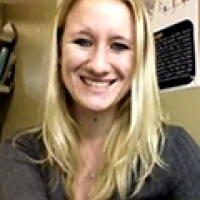
Madeline Hoon
Received: 2015
"Engineering of Mesenchymal Stem Cell Derived Exosomes with miR-132 to Increase Angiogenesis"
Host Mentor: Jan Nolta, Ph.D.
UC Davis Institute for Regenerative Cures
Peripheral arterial disease is an ischemic tissue related disorder characterized by a lack of adequate blood flow to the extremities. This occurs when the artery is blocked, typically as a result of atherosclerosis. Mesenchymal stem cells (MSCs) have been shown to be a possible therapeutic for ischemic diseases through their ability to secrete pro-angiogenic signals. Recently, it was shown that exosomes isolated from these MSC are key components in the delivery of pro-angiogenic factors. MSC exosomes have been shown to increase angiogenesis of endothelial cells in vitro as well as in vivo using mice models of peripheral arterial disease. In this study, bone marrow MSC derived exosomes were engineered to have an increased concentration of the pro-angiogenic microRNA, miR-132. Human umbilical vein endothelial cells were treated with these miR-132 exosomes in vitro. Through fluorescence microscopy we confirmed that the endothelial cells were able to uptake the exosomal contents of the engineered exosomes. The cells that up took the exosomal contents from either the miR-132 engineered exosomes or wild type exosomes displayed increased cell proliferation as well as increased angiogenic capabilities. The results of this study highlight the importance of exosomes in how mesenchymal stem cells confer a proangiogenic effect.


Haley DuBois
Received: 2015
"Injection of Naked DNA as A Potential Gene Therapy Approach for Muscular Dystrophy"
Host Mentor: Michele Calos, Ph.D.
Stanford University
Muscular dystrophies are a group of degenerative diseases that arise from genetic mutations that cause a loss of function in the corresponding gene products. Of particular interest is Limb Girdle Muscular Dystrophy Type 2B (LGMD2B), which is caused by mutations in the Dysferlin gene (DYSF). Here, we describe a potential gene therapy approach to deliver the healthy, full-length DYSF coding sequence in a safe and long-lasting manner to muscle fibers. We have injected Dysferlin-negative mice with naked DNA designed to knock-in DYSF using φC31 integrase. φC31 is a serine recombinase that mediates site-specific integration by recombining endogenous pseudo attP sites within the mammalian genome with exogenous attB sites that are introduced on a donor therapeutic plasmid. After one delivery with the hydrodynamic limb vein injection method, an average of 20% of muscle fibers expressed DYSF. We will also be testing whether this approach can transfect or stimulate endogenous muscle stem cells. Currently, we are applying this therapy to Dysferlin-null mice. We will also be translating this approach to other mouse models of muscular dystrophy, including Duchene Muscular Dystrophy and Limb Girdle Muscular Dystrophy Type 2D, with an ultimate goal of moving these therapies to the clinic.


Angela Shaver
Received: 2015
I would like to think of myself like a wave barraged barnacle, strong. My nature is flexible like a macroalgae blade. My mind I should hope, is as fecund with ideas as a Mola mola is with eggs. I wish to thank my instructors for providing me with a solid foundation in Fisheries Biology. Their commitment to providing truly comprehensive and engaging classes has instilled in me a deep understanding of aquatic ecosystems and how we may pursue sustainable management.
I am grateful for Humboldt’s applied learning environment, as I believe it is essential for this field of science. Of course, it is also incredibly fascinating in itself, to participate in activities such as: endangered species monitoring, limnological surveys, rearing of aquatic organisms, and so much more! I also quite enjoyed my time as a Habitat Restoration Crew Member for the Humboldt Fish Action Council in partnership with the Humboldt Natural Resources Club.
I believe that the statement that best characterizes Fisheries Biology, also applies to my after-graduation voyage to success. That is, “It’s complicated”. My will is as indomitable as that of a returning salmon; and it seems that, like a salmon I cannot keep myself restricted to just freshwater science or marine science. I wish to gain more experience in Marine Biology and work at sea.
I am currently seeking a position as a Fisheries Observer. My main duty will be collecting and recording fish catches and biological samples for the National Marine Fisheries Service aboard commercial fishing vessels. I have also applied for fisheries and marine mammal technician positions. I enjoy the idea of working off the coast of Alaska, even with or to some extent because of the challenges it will present. I would also like to travel to New Zealand and Australia; as I am captivated by the mind-boggling biodiversity of fishes and aquatic arthropods.
2014

James A. Freeman
Received: 2014
’80 MA, English
James Freeman has used his remarkable gifts for writing and teaching during a 36-year career that includes publishing 18 books of fiction and poetry, along with authoring several textbooks. In 2006, he earned the prestigious Philadelphia Inquirer Editor’s Choice Award for his book, Ishi’s Journey from the Center to the Edge of the World, a work of historical fiction chronicling the life of Ishi, believed to have been the last living Yahi Indian.
In November 2013, Freeman published a book of poems titled Temporary Roses Dipped In Gold. Collaborating with Thomas Gage, HSU professor emeritus in English, he followed up that effort with the recently completed The Hyskos History of Biblical History, a book focused on debunking biblical myths and confirming ancient truths.
Freeman’s time at HSU, he says, provided the ideal foundation for his career, offering a “practical bridge from academic learning and learning how to learn for a lifetime, to a sustainable career of meaningful life’s work.”
An instructor at Bucks County Community College in Newton, Pa., since 1982, Freeman has taught classes ranging from children’s literature to brain physiology. He began his career in education as a lecturer at HSU, teaching English and serving as an instructor in the Upward Bound program from 1978 to 1981. He also taught at Southern Oregon University and Shasta College before taking the position at BCCC.
Along with his teaching responsibilities, Freeman also participates in a variety of conferences and workshops, including the Silomar California Teachers of English annual seminar, the Philadelphia Writing Conference and the Two Year College Northeast Region annual conference.
Freeman earned his Master of Arts in English from Humboldt State in 1980, with an emphasis on preparing college and high school teachers of writing.


Bruce Jackson
Received: 2014
'84 Political Science
Helping bring the private sector into the business of space travel, Bruce Jackson’s work as Vice President of Trade Controls and Export Strategy is critical to the future of Virgin Galactic, the world’s first space tourism company.
Jackson’s primary responsibility is to work in unison with federal agencies to protect the use of sensitive technology developed in the private sector while still encouraging development and innovation. Known as an expert in international trade, Jackson previously served as Vice President of JP Morgan’s Trade Management Consulting Group.
According to Jackson, his experiences at Humboldt State set his intended path in motion. “I knew going into college that I wanted to pursue a career with an international focus, and the opportunity to study abroad during my third year, and my time involved with Model UN while at Humboldt helped me prepare for that future,” Jackson said.
Jackson has more than 29 years in the export compliance field, having worked both in the government and private sectors. He was also recently appointed by the U.S. Secretary of Commerce to the department’s Regulations and Procedures Technical Advisory Committee (RPTAC) and is also the current chair of the Export Controls Subcommittee of the Commercial Spaceflight Federation (CSF).
Prior to joining Virgin Galactic, Jackson was the Exports Practice Leader for J.P. Morgan’s Trade Management Consulting group in North America. J.P. Morgan acquired the software and consulting start-up Vastera Inc in 2005 where Jackson was also the Exports Practice Leader of the Trade Management Consulting Group. His clients included companies cutting across a wide range of industries, from Silicon Valley startups and “mom and pop” manufacturers of specialized industrial and aerospace components, to global 100 corporations.
Earlier in his career, Jackson worked for ABB Asea Brown Boveri, the Swiss-Swedish electrical engineering giant. He was based in Mannheim, Germany, for 10 years, arriving three weeks after the Berlin Wall came down. He also worked as a consultant in the international trade practice group of a major Wall Street law firm. He began his career at the U.S. Department of Commerce Bureau of Export Administration.
Jackson graduated from HSU in 1984, earning a bachelor’s in Political Science. He has also studied at the Institute for East European Studies and the University of Uppsala, Sweden. Jackson resides in Las Cruces, N.M., with his wife and three children.


Kaitlin Yarnall
Received: 2014
’05 Geography, Spanish
Gaining prominence in her field in a very short time, Kaitlin Yarnall has worked as Deputy Creative Director for National Geographic magazine since 2011. Her role includes managing a staff of 25 editors, production designers and specialists, and researchers for one of the world’s most prestigious publications.
A summer internship with the magazine following her senior year at HSU opened the door for Yarnall’s career at National Geographic, which has included stints as Senior Research Editor for maps and Deputy Art Director. Yarnall has earned multiple awards, among them honors from the Society of News Design, the American Society of Magazine Editors and Society of Publications Design. She is a frequently sought after speaker on topics of cartographic and infographics design.
In her current role, one of Yarnall’s most prominent projects is serving as editorial lead and National Geographic project manager for the 2014 series, “The Future of Food,” produced in partnership with the United Nations.
In 2012, Yarnall was part of a team that profiled HSUForestry Professor Steve Sillett’s research on the world’s tallest trees. For a recent issue on the Titanic, she worked with film director James Cameron and engineers from the U.S. Navy to create an interactive map of the ship’s remains. Also in 2012, she combed through world population data to create a profile of the world’s most typical person.
Kaitlin earned Bachelor of Arts degrees in Geography and Spanish at Humboldt State, graduating summa cum laude in 2005. She continued her education at the George Washington University in Washington, D.C., earning a Master of Arts in Geography in 2008.
While at HSU, Yarnall studied abroad in Quito, Equador while pursuing her Spanish degree. “This time and program, which included working in a hospital, prepared me to travel and operate within the developing world,” Yarnall said. “This prepared me for field research in graduate school and also for much of the travel I’ve had to do with National Geographic.”

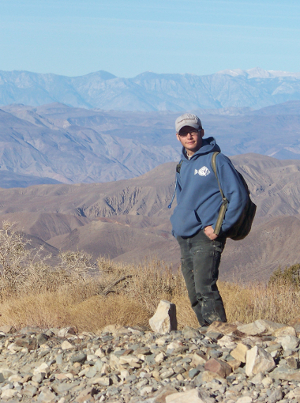
Christopher Borg
Received: 2014
I am honored to have received the Michael G. Scott award and I am thankful for many individuals from the Humboldt campus, including: faculty, staff, and students alike.
The Fisheries program was challenging and provided me with many wonderful hands on experiences. Originally I thought I would use the knowledge I gained to start up my own fisheries consulting firm. However after working as a fisheries technician for the California Department of Fish and Wildlife and a private consulting firm, I found that I needed something more that the work was not providing me. So the following summer I had the opportunity to volunteer for the Urban Farming Guys in Kansas City, Missouri. Here I became introduced to aquaponics and social justice issues pertaining to food. From this experience I found that I needed more of a human element in my work. Now I am interested in finding a way to combine my fisheries experience with social activism in order to strengthen local food systems.
Currently on the plate I am looking to become a master gardener and find a suitable college to study sustainable food systems.
2013


Clifford Allenby
Received: 2013
'59
A high-ranking state gubernatorial appointee across eight California administrations, Cliff Allenby (’59 Economics, Psychology) has also been a community activist for more than 20 years, including service to the Elk Grove Unified School District Governing Board. Allenby served a 23-year tenure with the California Department of Finance, where he rose to the position of deputy director and became the department’s top economic and tax advisor. He went on to work for then-Governor Jerry Brown in the same post, to which Gov. George Deukmejian named him again in 1983. Four years later, Deukmejian shifted Allenby to his Cabinet as Secretary of the Health and Welfare Agency, responsible for 11 departments and offices with more than 40,000 employees and budgets exceeding $28 million. Allenby took a break from state government in the early 1990s to work for the California Building Industry Association as senior staff vice president for governmental affairs. Late in 1997, Gov. Pete Wilson summoned him back to civic service to head the Department of Developmental Services, which he led for eight years. In succeeding years, Allenby became Gov. Gray Davis’s interim director of the Department of General Services and Gov. Arnold Schwarzenegger’s interim director of the Department of Social Services. Allenby stepped down in 2007 to chair the state’s Managed Risk Medical Insurance Board and helped to create the Health Insurance Plan of California and Aid to Infants and Mothers. An attempt at retirement didn’t last long: early in 2011, Allenby was named to his present post, acting director of the California Department of Mental Health, where he oversees 12,000 employees and an annual budget of $6.4 billion. The recipient of many awards over the years, including “Outstanding Public Administrator” from the American Society of Public Administrators, Allenby was honored again in mid-2012 by the society’s Sacramento chapter with the Ross Clayton Lifetime Distinguished Public Service Award for a career that has spanned half a century. Allenby and his late wife Sandy were both graduates of Eureka High School and high school sweethearts and they were married for 50 years. At the end of 2010, they set up the Cliff and Sandy Allenby Endowment to benefit Humboldt State University.


Ellie Cachette
Received: 2013
’06 Political Science
Ellie Cachette (’06, Political Science) is the first recipient of Humboldt State University’s Recent Distinguished Alumni Award.
Passionate about public health, Cachette was recognized by the California State Senate as an “Outstanding Educator” in AIDS and public health, prior to attending Humboldt State and continues to be active in public health communities. She received several scholarships including KRON4’s Beating the Odds.
After years of startup investing and experience, Cachette now specializes in early stage venture capital investing, often blogging about venture as an asset class or other trends on her website. In 2021 Cachette spearheaded a scholarship in her father’s memory available to Humboldt State students in need of support from low income backgrounds pursuing careers in public health.
Cachette resides in Miami, Florida and collaborates often with Humboldt’s endowment and planning processes.


Robert Henry
Received: 2013
'67 Social Science
Robert Henry – One of California’s foremost education attorneys, Robert Henry evidenced his promising future in his accomplishments at HSU (’67, Social Science). Born in Washington State but reared in Humboldt County, Henry was twice elected HSU student body president, served as president of Tau Kappa Epsilon social fraternity and was honored as Humboldt State’s Man of the Year in 1967. He received his law degree in 1971 from the University of California-Berkeley School of Law (Boalt Hall). After serving as an attorney for the California State University, Henry formed a law firm in 1984 to represent schools and colleges. The new School and College of Legal Services of California became a notable success, growing to represent more than 200 educational entities—charter schools and school districts, community college districts and county offices of education. Henry’s career spans some 40 years of practice, in which he has successfully represented clients before every level of state, federal, appellate and supreme courts. He pioneered the Joint Powers Agreement, which unites diverse clients and provides them legal services that are accountable, economical and student-centered. Henry’s arguments have resulted in numerous precedent-setting decisions before the California Supreme Court and the Federal Court of Appeals. In the words of one long-time colleague, Henry redefined legal service for public education in northern California and “saved the taxpaying public millions of dollars and much time and anguish.” In addition to his legal work, Henry has presented hundreds of workshops around the state, training and informing school superintendents, boards of trustees and other education officials and staff about the frequent changes in the law. Despite retiring from full-time work in 2004, Henry has found his services in regular demand; he continues to serve with the School and College of Legal Services, which has offices in several northern California communities. In 2006, the Sonoma County Bar Association honored Henry with its Career of Distinction Award and he is also a recipient of the Rio Dell Elementary School District Distinguished Alumni Award.


Rick Rosenthal
Received: 2013
’67 Zoology
Rick Rosenthal (‘67, Zoology) is a multiple Emmy and BAFTA award winning cinematographer who specializes in natural history. Growing up in southern California, Rick learned to free dive at an early age. His first professional opportunity came when he was hired by Sea World to assist with the care and training of whales. While completing his undergraduate degree at HSU, he also served as the first dive instructor. Rosenthal later received an M.S. in marine biology from San Diego State University. After graduating from HSU, he was hired onto the scientific staffs at Westinghouse Ocean Research Laboratory in San Diego, and Scripps Institute of Oceanography. Some years later he relocated to Alaska, and worked as a consultant to the Alaska Department of Fish and Game, the Office of the Governor, the National Marine Fisheries Service and the U.S. Fish and Wildlife Service. As a scientist, he has written more than 40 research papers and popular articles on marine biology, ecology and animal behavior. Underwater camera work played a key part in his early research. Compelled to share his observations with a larger audience, he began working in television and filmmaking. In 1984, Rosenthal began a long association with the prestigious BBC/Natural History Unit in Bristol, England. This was a launching pad for many worldwide assignments that included being a principal cameraman for BBC’s landmark Blue Planet series, a nature documentary series described as the “first ever comprehensive series on the natural history of the world’s oceans.” Following this work he received commissions for three major films on the great whales, and key camera work for the BBC/Discovery blockbusters Planet Earth and Life. His latest Emmy (2011) was for the National Geographic television series Great Migrations. Rosenthal’s most recent film work is an integral part of two television specials: Superfish and Hot Tuna. Both films are currently being broadcast worldwide, and have been screened at HSU. His latest film project entitled The Dark Side of the Ocean is scheduled for production this year, and will most certainly push the boundaries of open ocean exploration and discovery.
2012

Dean Bresciani
Received: 2012
'84


Kenneth Davlin
Received: 2012
'59-62 Engineering
As a member of the University's Advancement Foundation Board, Kenneth Davlin is part of a team that helps increase charitable giving and manage the university's endowment.
Davlin studied engineering at HSU from 1959-1962 and received a degree in civil engineering from the University of Utah. His engineering career has included work on hydroelectric, wastewater, housing and alternative energy projects. Davlin is President of Oscar Larson & Associates, a California-based engineering consulting firm.
As part of the 29-member Advancement Foundation Board, Davlin is particularly interested in expanding the university's business and engineering programs. He says: "Both contribute to better future organizations, wiser infrastructure development and more sensible financing programs."
Looking ahead, Davlin envisions a board that has a broader geographical base of membership. "I'd also like to see expansion of the Foundation so that it can better serve every department, college and facet of the university," he says.


Chester Mathis
Received: 2012
'72 Chemistry
Chester Mathis came to HSU as pre-med student, but found he had a greater interest in chemistry than medical school. Still, he found a way to study both by pursuing medicinally related chemistry.
His decision turned out pretty well for the field of Alzheimer's research. Mathis is currently an Endowed Chair Professor of Radiology and Pharmaceutical Sciences and Director of the Positron Emission Tomography-or PET-Facility at the University of Pittsburgh.
Recently, he and his geriatric psychiatry research partner William Klunk developed a radiolabeled dye that makes it possible to identify amyloid-a substance found in the plaque associated with Alzheimer's disease-in a living brain.
Mathis' research earned him a slew of awards, and he is continuing his work. He is now using the same technique to identify tau, another protein deposit found in the brain of Alzheimer's patients. Last year, the Michael J. Fox Foundation commissioned Mathis to develop a similar compound to identify alpha-synuclein, a protein deposit found in patients with Parkinson's disease and Lewy body dementia.


Marla Spivak
Received: 2012
'78 Biological Sciences
Beekeeping has long been a passion for Marla Spivak, an internationally renowned entomologist and expert on honeybee health. Spivak, who is currently a Distinguished McKnight Professor in Entomology at the University of Minnesota, recently received the John D. and Catherine T. MacArthur Foundation "genius award" for her pioneering work to protect honeybees from decimation by disease.
One of Spivak's most practical accomplishments has been the breeding of the Minnesota Hygienic, a strain of bees that uses olfaction to "sniff out" infected pupae and remove them from the hive before they can spread disease to the rest of the colony. In addition to supporting her research, the MacArthur award has enabled Spivak to launch the Bee Squad, a program that educates, trains and assists beekeepers and bee supporters in the Twin Cities area. Her goal is to restore healthy bee populations and pollinator landscapes by providing hands-on mentoring to people interested in supporting bees.
During her undergraduate studies at HSU, Spivak took a semester off to volunteer with Steve Taber, a renowned honeybee researcher. Taber ignited Spivak's interest in studying bees, and as soon as she completed her degree, she traveled to South America to conduct bee research. Since then, her groundbreaking research has taken her around the world and earned her numerous accolades.

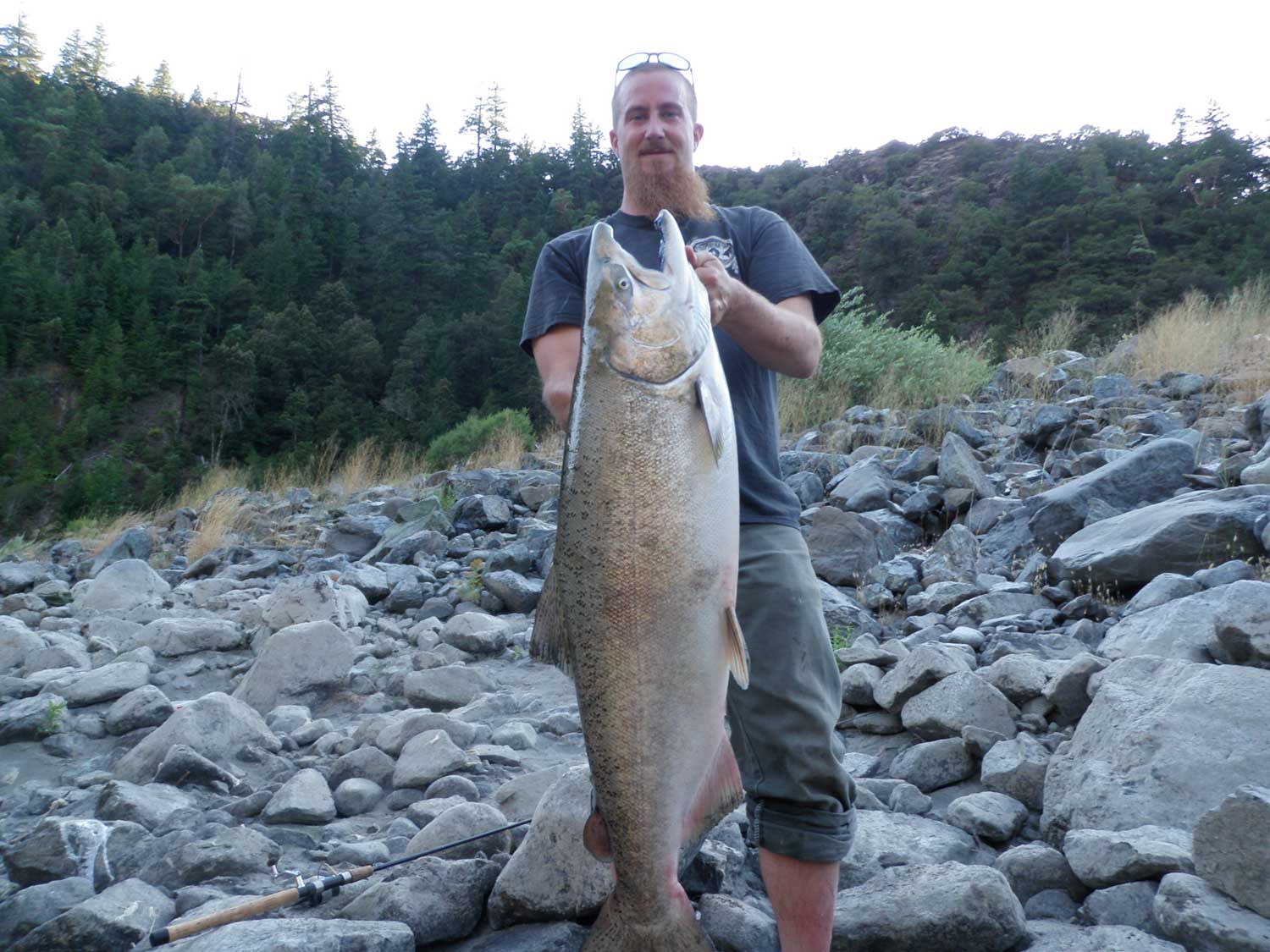
Nate Cooley
Received: 2012
During my three years at Cal Poly Humboldt, I had the privilege of being employed by the California Cooperative Fish and Wildlife Research Unit (USGS, CDFG, and Humboldt). I worked in Redwood National Park on Prairie, Lost Man, and Redwood Creeks. In the winter, we trapped adult salmonids and conducted spawning/carcass surveys. The summers were filled with electrofishing, habitat mapping, snorkel surveys, and down-stream migrant trapping. I also had the opportunity to work in the Humboldt Fish Genetics Lab, the Humboldt Fish Collection, and for several graduate students. As a father and husband, I had to overcome many challenges to succeed in my studies. I worked two or three jobs at a time, on weekends and holidays, and in between classes. Yet I still made the time to explore all of Humboldt County with my family (and to do some fishing!).
I completed classes in December 2011, and two days later I started my new job in my home town, Fort Bragg, CA. Now I am employed by the Pacific States Marine Fisheries Commission (with CDFG) operating a DIDSON sonar camera on Pudding Creek. I never thought my training in the U.S. Navy as a submarine sonar technician (’96-’00) would prepare me for a career in fisheries biology, but I found a way! I also operate PIT tag antennas on Caspar Creek and assist with down-stream migrant trapping on three streams, as well as spawning surveys on most coastal Mendocino County streams.
I would like to thank Humboldt, my professors, and my classmates for giving me the skill set and perspective that will be required as I continue in the effort to protect and rebuild our Pacific salmon and steelhead populations, for my children and for future generations.
2010


Michael Crooke
Received: 2010
'86 '89 Forestry, MBA, Business Administration
Michael Crooke's journey through corporate boardrooms is guided by values rooted firmly in the Earth.
Growing up in Oregon, he says he was always at home in the wilderness. "I was an outdoors person, always hunting, fishing, camping and hiking."
Little wonder that he was drawn to Humboldt State's Forestry program, graduating in 1986.
"I wanted to work outdoors," he says, and so he did - for a while. His career as a forester for the Pacific Lumber Co. ended during that company's acquisition by Maxxam Corp., a corporate maneuver he found unsettling - and interesting enough to draw him indoors.
"It rattled my cage," Crooke says. "I really wanted to understand the business side."
After earning an MBA from Humboldt State in 1989, he entered the corporate world, working for local outdoor equipment manufacturers Yakima and Moonstone, and later becoming CEO of Pearl Izumi, Revolution Living, Patagonia and prAna.
Crooke has since earned a Ph.D. in management and is now a business consultant specializing in corporate turnarounds. But his environmental activism continues to inform his corporate work.
"I found that I could incorporate my personal values into business," he says. His work is guided by what he calls "a mandala approach" of four equal principles: corporate citizenship, environmental responsibility, product/service quality and strong finances.
"When you have those four corporate macro values in place, 'flow' often occurs," he says, defining "flow" as "a rare state of consciousness that focuses the energies of those who experience it and helps lift them to peak achievement levels."
Crooke remains a board member of the Earth Day Network and has served as President of the Conservation Alliance. He remains an HSU supporter and delivered a rousing keynote address at the 2008 Commencement.


Sue Grigsby
Received: 2010
'79 Liberal Studies/Recreation Administration
Sue Grigsby has always been a blur on the landscape, but it wasn't until she came to Humboldt State that her track career really took off.
After high school in Los Altos, Grigsby had joined a community college men's track team. It was before women's sports began gaining equality under Title IX. "I was, fortunately or unfortunately, from an era when women were just starting out," she says.
As she contemplated her next step, her coach made a fateful suggestion: "You ought to check out Humboldt." She did, and ran with it.
By the time she graduated in 1979, Grigsby had left a trail of shattered records in her wake, in 800-, 1,500-, 3,000- and 5,000-meter events. Her accomplishments earned her admission to HSU's Athletic Hall of Fame in 1987.
And she's still on the move. Now a Physical Education, Health and Wellness instructor at Everett Community College, Grigsby's educational philosophy focuses less on teaching and more on leading - encouraging students to reach their personal best.
That takes creativity and energy, things the enthusiastic Grigsby has in ample supply. She might hide poems around town and ask students literally run them down, or offer cryptic clues to area landmarks for students to locate.
"In some of my classes, I'm largely a cheerleader," Grigsby says. She is also a mechanic, supplying students with the nuts and bolts of healthy living. "I don't teach 'PE,'" she says. "That sounds like you just throw out the ball and play. I teach physical education, health and wellness, where you teach the how-tos and the whys."
Grigsby looks back in gratitude to her time at Humboldt State, and has never forgotten what instructor Larry Kerker told her: "You're on a scholarship from the State of California."
She's since augmented that for today's students, setting up the Sue Grigsby Scholarship Endowment for HSU kinesiology majors and the Sue E. Grigsby Women's Distance Running Endowment.
"I help students change their lives," she says. "It feels good."


Shaunna McCovey
Received: 2010
'96 Social Work
With degrees in law and social work, a love for the natural environment and a commitment to her Yurok Tribe, Shaunna Oteka McCovey has no shortage of work.
McCovey grew up on the Yurok reservation outside Weitchpec without electricity or even telephones. So she busied herself with books.
On coming of age, she was "isolated and kind of floundering," but says, "I knew there was this big world out there and I wanted to be part of it." Then she attended Humboldt State's 1992 Commencement and saw her father graduate with his degree in social work.
"I said, 'This is what I want to do and this is where I want to go,'" McCovey remembers.
Four years later, she graduated from HSU with a bachelor's degree in social work, later earning a master's degree in social work from Arizona State.
McCovey put herself through school by working at Arcata's Seventh Generation Fund, an Indian advocacy organization. That experience helped solidify her environmental values. "I was able to understand how environmental justice impacted minority communities," she says.
She earned a master's degree in environmental law, then eagerly accepted a First Nations Environmental Law Fellowship at Vermont Law School, later graduating with a law degree.
Returning to Humboldt, McCovey taught and helped the HSU social work department develop a masters program for work in rural and native communities.
But the needs of her people beckoned, so McCovey went to work as staff attorney for the Yurok Tribe, California's largest Indian Tribe with nearly 5,000 enrolled members. In that role, she assisted with issues like the Klamath Dam removal. Now, as deputy executive director and self-governance officer, she's working to ensure that the Marine Life Protection Act respects the Native American way of life.
McCovey celebrates native culture in literature as well. A published author, her book of poetry is titled The Smokehouse Boys, and she contributed to Eating Fire, Tasting Blood: An Anthology of the American Indian Holocaust.
McCovey says that, over the years, she has enjoyed tremendous support from HSU faculty members acting as mentors.
"I'm very proud to have gone to Humboldt State, and of going back to teach there," she says. "I had a great experience."

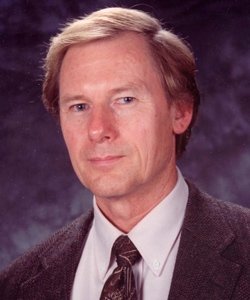
Robert Powers
Received: 2010
'66 Forestry
Robert Powers passed though Humboldt State's Forestry program in an era when sustainable management and carbon sequestration were faint concepts. Today, the 1966 graduate is a renowned Forest Service scientist who, even in retirement, stays active in cutting-edge research.
Forests, he says, offer obvious environmental positives, from habitat to watersheds and, not inconsiderable, beauty. But he says the forests' most basic contribution is not apparent, but is basic to the well-being of the environment - locking up carbon.
"The fundamental thing that forests do is capture carbon from the atmosphere in creating vegetation," Powers says. The central question now, he says, is how modern management is affecting the land's ability to do this.
Forest soils are earth's largest terrestrial sink for atmospheric carbon. Soil, Powers says, is like an organism, with juvenile and mature stages, but with one major difference. "It takes millennia for the soil to develop," Powers says. "But poor management can degrade it in the blink of an eye."
In seeking to understand soil's survivability, Powers conceived the North American Long-Term Soil Productivity Research Program. At more than 70 sites across North America, data is collected to improve our understanding of how soil changes affect plant growth and to develop means for measuring this. "Until now, it's largely been speculative and anecdotal," he says. Powers' research could yield key clues to crafting climate catastrophe countermeasures.
He credits his HSU experience with cultivating his curiosity. He initially considered U.C. Berkeley (where he eventually earned his Ph.D.), but decided on HSU for a more intimate undergraduate experience, and it paid off. "I enjoyed the hands-on experience with young, enthusiastic professors," he says. "You don't always get that at a larger university. They got students to look at the forest as more than a collection of trees."

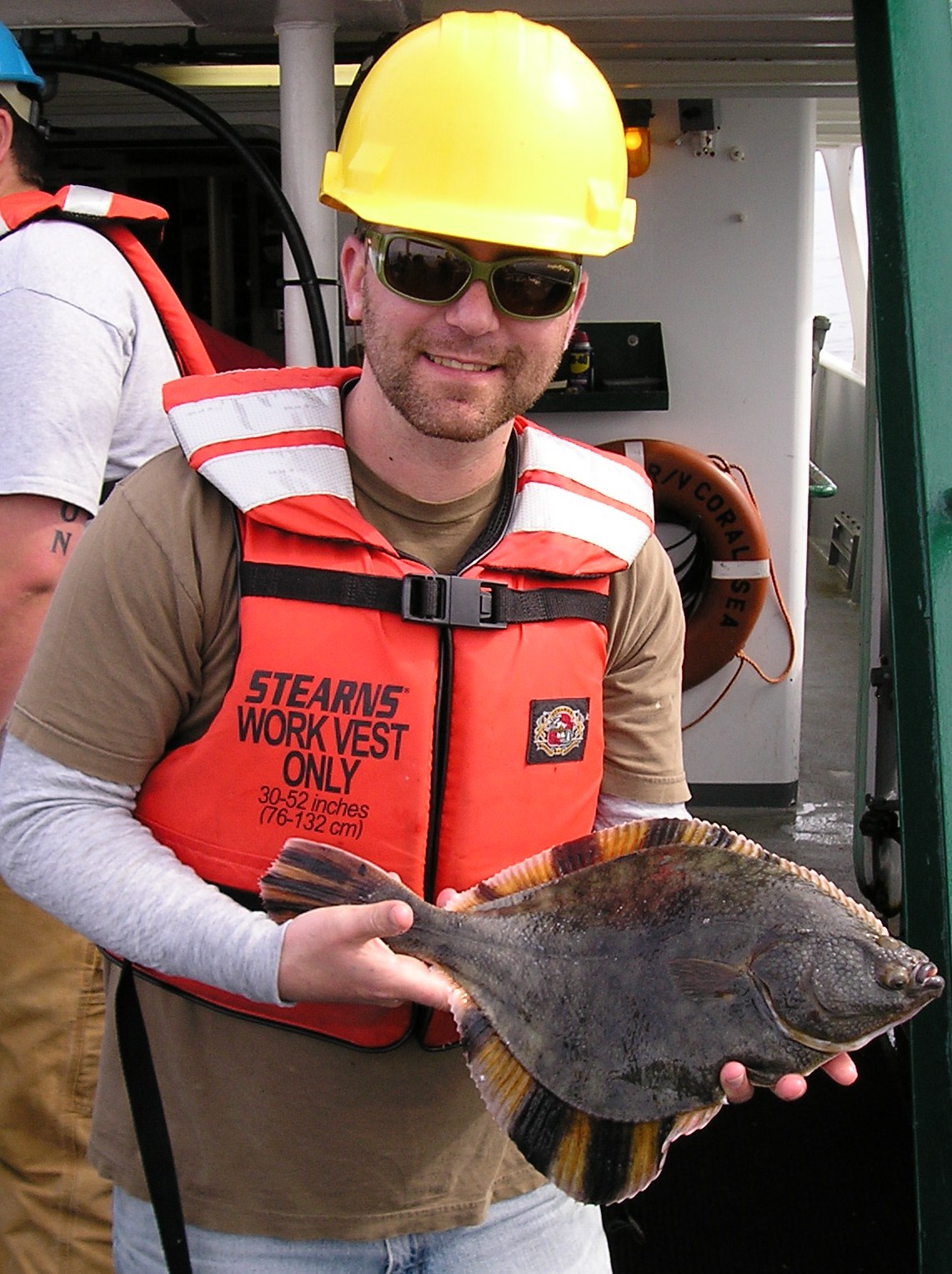
D. Allan Martin
Received: 2010
Upon graduation from Humboldt I began working for Pacific States Marine Fisheries Commission as a Biologist in the Smolt Monitoring Program. This entails determining the species, run, rear type and condition of out-migrating salmonid smolts on the Snake River. My observations, along with numerous recorded metrics, provide biological assistance to the Army Corp of Engineer’s Smolt Transportation Program.

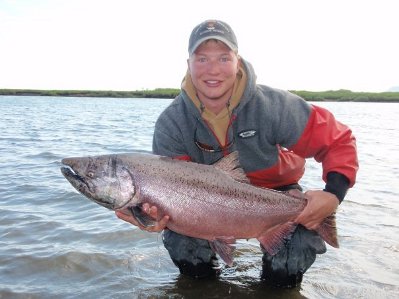
Sean Larson
Received: 2010
After completing my fisheries biology degree at Humboldt, I went on to receive a Master’s in Fisheries Science at the University of Alaska Fairbanks School of Fisheries and Ocean Sciences in Juneau, Alaska. For my thesis, I investigated the impacts of the expanding sea otter population on commercially important sea cucumbers in southeast Alaska. After spending a year commercial fishing, I decided it was time to get serious and I moved to Anchorage. I currently work for the Alaska Dept. of Fish & Game as a research biologist for Chinook and chum salmon on the Yukon River.
I will always appreciate the great staff and resources that the fisheries program at Humboldt provided. Thanks, fish folks at Humboldt, for an awesome four years and for giving me the skills necessary to be a productive fish biologist.
2009

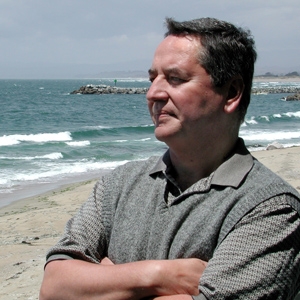
Francisco Chavez
Received: 2009
'77 Oceanography
Francisco Chavez has had an illustrious career in biological oceanography. He is a Senior Scientist at Monterey Bay Aquarium Research Institute (MBARI), where he has been on staff for 20 years.
Born and raised in Talara, Peru, Chavez graduated from HSU in 1977. At MBARI, he pioneered new types of research and played a pivotal role in that institution's success almost since its founding. He sits on numerous ocean and marine observation boards, contributing to our knowledge of and protection of coastal resources. Because HSU is also represented in many of these organizations, Chavez has directly and indirectly contributed to HSU developing effective regional collaborations.
In 2005, Chavez was elected a Fellow of the American Association for the Advancement of Science for his research on the impact of climate variability on oceanic ecosystems and global carbon cycling. Such Fellows are elected for "significant contributions in areas such as research, teaching, technology, services to professional societies, and the communication of science to the public."

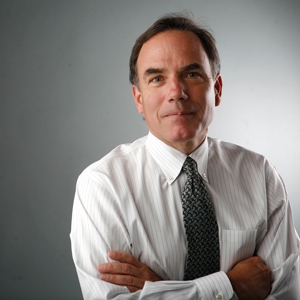
John Diaz
Received: 2009
'77 Journalism
Throughout his journalism career, John Diaz's work has been recognized for its excellence. Dating back to his time as a journalism student at Humboldt State, one former professor recalls, "You couldn't miss John in the classroom, given his effective in-class participation, excellent performance on assignments and sense of humor. My colleagues and I all expected greatness from him in his journalism career and he has met those expectations."
Diaz has been editor of the San Francisco Chronicle's editorial page since 1996 and has won numerous awards for editorial writing throughout his 30-year journalism career. His topics have been as diverse as the dysfunction of California Legislature, financial privacy, and untreated mental illness. Because of his reputation as an insightful communicator, he is frequently asked to offer commentary on national television news programs including NewsHour with Jim Lehrer. He has also served as a juror for the Pulitzer Prize in both 2001 and 2002.
Diaz continues to give back to his profession by mentoring journalism students and young reporters in the San Francisco area. He regularly volunteers his time with young members of the National Association of Hispanic Journalists and served as guest Editor-in-Residence at HSU, where he critiqued the student newspaper and shared his years of experience with numerous journalism classes.


Richard E. Winnie
Received: 2009
'69 Economics
Richard Winnie has always had a strong sense of civic responsibility, from his college days in the political clubs of HSU all the way to advising newly-formed states in Central and Eastern Europe. In his distinguished career as an attorney, he has been solving complex regulatory problems as private and public counsel to all levels of government for over 30 years.
Recently the County Counsel to Alameda County, Winnie has also served as staff attorney to the California cities of Berkeley, Oakland, and Santa Rosa. Although his position sometimes inserted him in the middle of polarizing political debates, he consistently maintained his integrity and principles while making decisions that benefit the greater good.
In the international realm, he played a pivotal role as legal advisor on the establishment of new economic and governmental institutions in Central and Eastern Europe. He has advised such states such as Albania, Bulgaria, Croatia, and Kazakhstan, among others.
Winnie volunteered for over 20 years with numerous organizations on projects ranging from governance models to waterfront studies. His interest in civic service dates back to his time at HSU, where he served on the Associated Students Council, volunteered with the campus Young Democrats, and gave the valedictory address to his graduating class.

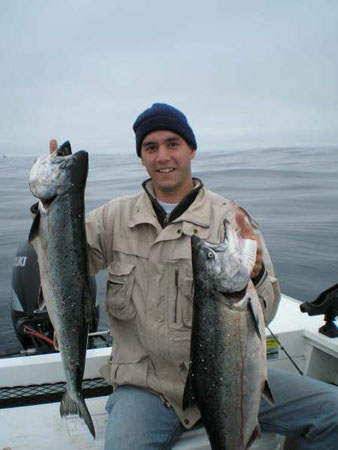
Michael Hellmair
Received: 2009
During my time at Humboldt I was able to gain priceless experiences in many techniques used in the field of fisheries science and was fortunate to be able to work in the fisheries genetics laboratory under Dr. Kinziger, completing a genetic fingerprinting project (of Chinook salmon) concurrently with my undergraduate course work. I have since had the opportunity to present the findings from this investigation at several scientific meetings, which has allowed me to meet and get to know many influential people in the field of fisheries biology. After I completed my undergraduate education at Humboldt in Fall of 2008, I was fortunate enough to be accepted into the Natural Resources graduate program (Fisheries Option) and am now working on a project focusing on the age and growth of the federally endangered tidewater goby.
I always have enjoyed – and continue to enjoy- working with the outstanding faculty at the Humboldt fisheries biology department and look forward to taking additional classes throughout my time as a graduate student.
2008


Richard Cuneo
Received: 2008
'62 Business Administration
Giving a century-old company a facelift was more than just a risky move, it was a brilliant one by Richard Cuneo. A man widely recognized for his career in the wine industry, Cuneo is currently Chairman of the Board of Sebastiani Vineyards and Winery, and credited with helping rebuild the Sebastiani image. In 2001, with Cuneo's diligent hard work and planning behind them, Sebastiani sold off its lower-priced, good value brands to focus solely on its premium wines. The upscale move gave Sebastiani just the desired boost in the market, thus establishing the name Sebastiani to be synonymous with Sonoma's finest wines.
While he may be most known for a successful and vibrant career in the wine industry, Cuneo is also strongly committed to community. Cuneo has served on the Board of Directors for several organizations including the Sonoma School Board, Hanna Boys Center, the Sonoma County Fish and Wildlife Advisory Board and the Governing Board of the California State Fair, for which he received the lifetime achievement award. Also a member of the Ducks Unlimited California Legislative Committee, Cuneo was appointed by the Secretary of Agriculture to serve as a member of the U.S. Agricultural Policy Advisory Committee in Washington, D.C., representing the wine industry.
With such a large impact locally, statewide and nationally, Cuneo has also made many positive contributions to Italian culture. In honor of these accomplishments, he has been recognized by the Italian Government as a Cavaliere (Knight) Officiale, The Sovereign Order of the Knights of Malta recognized him with, among other awards, the Croce di Grand 'Ufficiale Dell' Ordine (Cross of the Grand Official) one of the Order's highest honors, and in 2002, Prince Emmanuel of Savoy recognized Cuneo for his many contributions to Italy's history and culture.

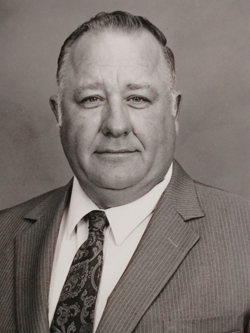
Terry Grosz
Received: 2008
'64 & '66 Wildlife
Whether as a professional in the field of wildlife law enforcement or as a prolific writer, Terry Grosz has distinguished himself with a kind of passion, dedication, integrity and professionalism that often exemplify Humboldt State alumni. The beginning of his 32-year career in wildlife law enforcement came in 1966 with the California Department of Fish and Game in Eureka. After several years and a transfer to Colusa, he was hired by the U.S. Fish and Wildlife Service (FWS), moving into increasing responsibility for conservation and wildlife law enforcement in successively larger geographic regions, from jurisdiction over the central half of Northern California to finally Assistant Regional Director for Law Enforcement where he supervised FWS's wildlife law programs covering 750,000 square miles.
When Grosz became the FWS Senior Special Agent, he wrote regulations, policy and procedures, responded to congressional inquiries, provided advice, guidance and expertise. But it wasn't just a desk job. He also traveled throughout Asia assisting foreign governments in curtailing the smuggling of wildlife and establishing cooperative international law enforcements programs. In all the various positions held by Terry, he supervised agents who protected wildlife from being smuggled or imported illegally into the US, protected eagles from being poisoned or trapped, and more.
In 1998, Grosz retired from the FWS and began a second career as a prolific writer, and has since authored and published seven books, with several more on the way. Clearly, he's got a lot of material to work with. Many of his stories have hilarious moments and hair-raising adventures, some others are sad and tragic, they are all about the men and women who work as wildlife conservation officers trying to preserve our natural heritage for future generations.
Visit Terry Grosz' website: www.terrygrosz.com


Lyle Laverty
Received: 2008
'65 Forestry
Lyle Laverty is more than just an outdoorsman and registered professional forester; he is a man of professionalism, public service and leadership. Upon graduation from Humboldt State, Laverty began his 30-year career with the US Forest Service. During this time, Lyle served at the local, regional, national and even international levels, culminating in 2001 when he became the Associate Deputy Chief of the Forest Service at the USDA headquarters. While at the USFS, Laverty was involved in creating management plans to improve habitat and protect species listed under the Endangered Species Act.
From California he moved to the Rocky State to become the Director of Colorado State Parks. Under his leadership, two new state parks were created, and two more are now in the planning stage. Attendance increased substantially at the Colorado State Parks when under Laverty's guidance, including expanded opportunities for economically disadvantaged youths from urban settings to experience the great outdoors. Laverty also travelled to Lebanon several times on USAID missions at the request of the USFS and the Ambassador to Lebanon to provide technical assistance to the Lebanese on natural resource issues.
As a seasoned high performing public servant, in October 2007, Laverty was confirmed by the US Senate as the Assistant Secretary of the Interior for Fish, Wildlife, and Parks, a position giving him the responsibility for overseeing policy for the US Fish and Wildlife Service and the National Park Service.


Robert Thomas
Received: 2008
'85 Geology
A man known for studying the history of rocks is also making a history of his own as man with a passion for change, public outreach, and of course, geology. Rob Thomas' childhood summer trips to National Parks first ignited his interest in geology, something that still burns strongly today. As a professor at University of Montana Western, his professional passions are still field geology and geological education. During his tenure at Montana Western, he helped the campus evolve from a traditional state 'normal school' into an experiential learning university, that uses an immersion scheduling system where students take one course at a time. Thomas teaches most of his courses where the class' lab is the natural lab of southwestern Montana.
With another strong passion for public outreach, Thomas has helped run 10 "Geo Venture" field trips for the Geological Society of America, for which he was awarded the Society's Distinguished Service Award. The Geo Venture trips provide both scientists and the average person with enriching learning experiences of each unique destination, such as the Canadian Rockies and the Yellowstone, Teton and Glacier National Parks. In addition, he has also co-authored 25 geological road signs that have been placed along the Lewis and Clark trail in Montana, and is co-writing a layperson book entitled "Geology Underfoot in Montana." He has also organized numerous symposia and authored and co-authored numerous publications. With such a long and extensive resume of accomplishments, Thomas still thinks his most important contributions are his two daughters, Abbey and Haley, and his nearly 20-year marriage to Anneliese Ripley.

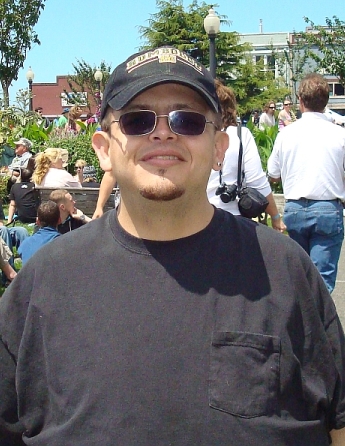
Alex J. Godinez
Received: 2008
In late 2009 I decided to go back to school to get my Master’s degree. In 2010 I was accepted to University of Alaska, Fairbanks’ School of Fisheries and Ocean Sciences in a new NSF-funded program called SELMR (Sustainable Ecosystem-based management of Living Marine Resources). My thesis project is on seascape genetics of Aleutian Island and Bering Sea slope blackspotted rockfish using microsatellites markers and geographic and oceanographic data to determine population structure and to identify the seascape features that may be shaping it.


Allison K. Thorsell
Received: 2008
2008 - Allison K. Thorsell
2007


Wesley Chesbro
Received: 2007
'69-'73 Natural Resources
Who would have predicted that Wesley Chesbro's stint in Humboldt State's student government would prove the beginning of a career in public service that would span over 37 years and include two terms in the California State Senate? Actually, if you knew Chesbro in those early days, you probably wouldn't have been surprised one bit. After all, he was elected to the Arcata City Council at the tender age of 22.
Chesbro served on both the city council and the Humboldt County Board of Supervisors. During that time he helped to found both the Arcata Community Recycling Center and the Northcoast Environmental Center, serving as the first Executive Director of both organizations.
In 1990 Chesbro became a founding member of California's Integrated Waste Management Board, where he successfully helped guide California to a 50 percent reduction in waste going to landfills through recycling and waste reduction programs.
As a state Senator Chesbro achieved the Chairmanship of the Senate Budget Committee, where he was a champion for higher education, K-12 education, environmental protection, local government and rural health care.
Upon leaving the State Senate last year due to term limits, Chesbro was re-appointed to the Integrated Waste Management Board and is now working to push waste reduction beyond 50 percent and focusing on reducing the contribution waste management makes to global warming.
What inspired Chesbro to devote so much of his life to serving the public? "I was raised in a family where I was taught that your actions speak louder than your words," the former senator explains. "My father was a minister and my mother was a school teacher and they spent their lives serving others. It was their example that led me to a life of public service."
Wesley Chesbro and his wife Cindy have two sons, Alan and Collin. Chesbro is very proud that his son Alan is currently a junior at Humboldt State University, majoring in political science.


Kenneth L. Fisher
Received: 2007
'72 Economics
Ken Fisher is one of the world's leading financial advisers. Fisher Investments-the global money management firm he founded less than a decade after graduating from HSU-manages tens of billions of dollars for prominent global institutions and affluent individuals. His success has landed him on the Forbes 400 Richest Americans list.
Ken Fisher regularly appears in the financial media and widely recognized as a financial guru. In 2011, he ranked in the top 5 most accurate market forecasters on CXO Advisory Group's Guru Grades* list. In 2010, he was named to Investment Advisor's 30 for 30** list-recognizing him as one of the most influential investment advisors in the previous 30 years.
Beyond serving as Fisher Investments' CEO, Ken Fisher is a prolific author. His "Portfolio Strategy" column has run in Forbes magazine since 1984-making him thefourth longest-running columnist in the magazine's over 90 year history. He has written 8 finance books, including 5 national bestsellers: The Only Three Questions that Count (originally published in 2006 and re-released in 2012), Ten Roads to Riches (2008), How to Smell a Rat (2009), Debunkery (2010) and Markets Never Forget-But People Do (2011).
Ken Fisher is also regarded as one of the world's foremost experts on 19th century logging and has documented more than 35 abandoned logging camps in the northern Santa Cruz Mountains. His passion for redwoods led him to endow the Kenneth L. Fisher Chair in Redwood Forest Ecology at HSU. It is the first named chair in Humboldt State's history and the first endowed chair in the world devoted to a single species of tree. (Read more about the Kenneth L. Fisher Endowed Chair.)
Ken Fisher and his wife, Sherrilyn, have three adult sons.
Leader of a major company, famous author and columnist, father, husband-Ken Fisher clearly has a lot on his plate. How does he manage to stay so productive? "I relaxed once and I never want to go through that again," Fisher says with a wry smile. "When I was young," he continues on a more serious note, "I got in my bones how compound interest works. Compound interest deployed right is magic, not just in finance, but in all of life. I compound my human capital at a slightly higher annual rate than most folks do because most don't try to-and I never, ever stop compounding."
*www.cxoadvisory.com/gurus. As of 5/29/2012. Fisher Investments has no affiliation with CXO Advisory Group. Ken Fisher's market forecasts in Forbes represent his personal forecasts of the overall market and are not an indication of the performance of Fisher Investments. Not all forecasts may be as accurate as those in the past. Investing in securities involves the risk of loss. Past performance is no guarantee of future results.
**Thirty for Thirty, Investment Advisor, 5/1/2010


Michelle D. Kelly
Received: 2007
'85 Nursing
Many people dream of using their education to serve people in other parts of the world. Michelle Kelly made that dream a reality. As a nurse practitioner, educator and expert in war zone relief operations, Kelly has helped civilians affected by war over the last 20 years. Her volunteer humanitarian work has taken her from her first job as an RN on the nearby Hoopa reservation to Afghanistan, Angola, Iraq, Kashmir, Somalia, Sudan, Rwanda, Sri Lanka, Kosovo and Uganda.
"Relief work is not glamorous, I deal with the warring parties, which are usually both rebel and government forces. Civilians are caught in the middle and the challenge is to provide aid to those in need. It can be dangerous," Kelly explains. "Having said that, I knew ever since I was young that I wanted to help others. I was raised with the belief that if you are doing well and have something to spare, that you turn around and help someone else. It's a belief that's served me well."
Somehow, despite an incredibly busy schedule of ongoing humanitarian work, Kelly also manages to inspire a new generation of HSU students as a dedicated lecturer in the Department of Nursing. "More students are coming to Humboldt State these days with a global view--they're interested in international work," says Kelly. "I'm glad I can bring them that experience."

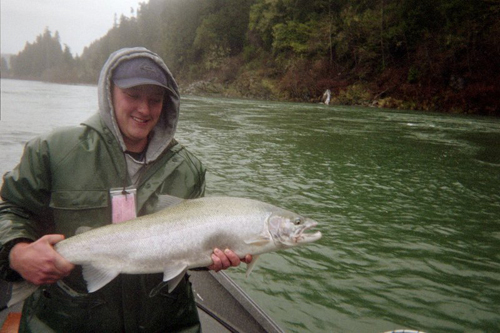
Jesse Nolan
Received: 2007
After graduation in May, I worked a seasonal fisheries job for the Oregon Department of Fish and Wildlife. Since then I have taken some time off to travel and fish. Last month I returned from a fishing trip to Barra de Navidad, Mexico where I caught my first Dorado. I will be living in this area until my long-time girlfriend Joanne graduates from Humboldt's engineering program this Fall. Upon her graduation we will be looking to relocate to an area where I can find employment in a hatchery salmonid setting.


Andrea Collins
Received: 2007
2007 - Andrea Collins
2006


Richard L. Corsi
Received: 2006
'83 Environmental Resources Engineering
Richard L. Corsi is the ECH Bantel Professor of Professional Practice, Department of Civil, Architectural and Environmental Engineering at The University of Texas. He received his B.S. in Environmental Resources Engineering at HSU in 1983, and his M.S. and Ph.D. in Civil Engineering at UC Davis. He has established internationally-recognized research programs in (1) emissions of toxins from wastewater, and (2) physics and chemistry of indoor air. Richard has served as principal investigator on 60 projects, including a recent $1.4 million study involving building disinfection chemistry in response to anthrax attacks in 2001. He has served as advisor to 45 graduate and 35 undergraduate students.
Richard and his students have published over 220 journal/conference papers and reports, and have been featured on the Canadian television series The Nature of Things, The Economist, Business Week, National Wildlife, Prevention, Men's Health, the San Francisco Chronicle, and more. He teaches courses in Fluid Mechanics, Air Pollution Engineering, and Indoor Air Quality, and in 2001 taught a course on indoor air quality at HSU. Richard has been honored with several awards for excellence in teaching and service to students. He has been married to Regina Benzonelli (1983 HSU graduate) for 23 years.


Kevin Daum
Received: 2006
'86 Theater Arts
Kevin Daum is an award winning and bestselling author of 5 books. He is a marketer, speaker, and columnist for Inc.com and Smart Business Magazine. As an Inc. 500 entrepreneur his sales and marketing techniques resulted in more than $1 billion in sales. Drawing on his background in theatre and business, Kevin is a compelling speaker who has engaged and inspired audiences around the globe.
Kevin has authored several books, including Amazon #1 Best Sellers Video Marketing For Dummies (Wiley) ROAR! Get Heard in the Sales and Marketing Jungle (Wiley), and Green$ense For the Home: Rating the Real Payoff on 50 Green Home Projects (Taunton), which is the 2011 winner of the American Society of Journalists and Author's (ASJA) Outstanding Book Award. He also penned the best selling Building Your Own Home For Dummies (Wiley), and What the Banks Won't Tell You (Grady Parsons).
Kevin uses his expertise to help individuals communicate effectively and reach their personal and business goals. He has built multiple businesses, including Stratford Financial Services, an Inc. 500 company; Mystery is Served, an entertainment company; and most recently TAE International, which helps companies provide their customers The Awesome Experience by mastering compelling messaging, intentional marketing and memorable delivery.
Kevin consults to numerous companies and non-profit organizations. He speaks regularly in the areas of marketing, communication, creativity, strategy, and execution. He also coaches executives on book development and thought leadership, as his most recent book proposals went from concept to contract in a few short months with major trade publishers.
Drawing upon a degree in theatre arts and involvement in more than 150 theatre productions, Kevin is changing the way corporations use the arts as a training ground for business and entrepreneurship. Kevin's ROARing Video Seminars help companies develop effective and entertaining video marketing programs. As head of business development for Americans For the Arts' Creativity Connection, he facilitated unique arts-based-learning programs for Fortune 500 companies. Kevin has been instrumental in the development of interdisciplinary arts and entrepreneurship curriculum at Baylor University. He has published several articles on marketing and the managerial relationship between the arts and entrepreneurship.
Kevin is a graduate of the MIT Entrepreneurial Masters program and has received the Global Learning Award 3 times from the Entrepreneur's Organization, where he held several board positions. Kevin has designed, produced, and led award-winning executive training programs and events for C-level executives and entrepreneurs on four continents. Previously, Kevin was named one of the 40 people to watch under 40 in San Francisco by the Business Times and in 2006 was named Distinguished Alum of the Year by his alma mater, Humboldt State University.


Eric Ramos
Received: 2006
'96 Business Administration
Eric Ramos is currently President of Business Operations for the Blue Lake Rancheria Tribe. Eric develops and manages the Tribe's diverse business interests, including the Blue Lake Casino - a 45,000 square foot gaming facility located in Blue Lake, California. He earned his B.S. in Business Administration, with an emphasis in Accounting and a Minor in Computer Information Systems at Humboldt State University in 1996.
Prior to working on Tribal interests full time, Eric held the position of Treasury Manager at Turnstone Systems, a large post-IPO start-up company, where he actively managed a cash and investment portfolio in excess of $270 million. His duties included international investments and management of transactions in dozens of foreign currencies. Before Turnstone, Eric was an auditor for KPMG in the Silicon Valley; where his client list included a number of high-profile public and private companies including Adobe Systems, Apple Computer and Daimler Chrysler Research & Development.
Eric has worked to channel the success of the Blue Lake Rancheria's business operations into widespread community involvement and investment. Most notably he has steered the Tribe's giving budgets into areas of education, community infrastructure improvements and public health and safety services.
Eric also represents Blue Lake Rancheria as their Tribal delegate in CNIGA - the California Nations Indian Gaming Association, where he works with other Tribes across California on legal, operational and planning issues affecting Indian Country.

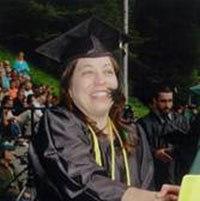
Debora Herndon
Received: 2006
After graduating in 2006 I started working for Nevada Department of Wildlife as a Conservation Aide in Boulder City. I assisted in netting surveys, data collection, data analysis, and assisted in the rearing of razorback suckers at the Lake Mead Hatchery. At the end of my seasonal position, I obtained a term position as a biologist with Nevada Department of Wildlife in Boulder City.
My current position as a biologist involves two different projects: The Lake Mead Razorback Sucker Augmentation Program and the Lake Mohave Habitat Enhancement Project. These two projects are quite different from one another allowing for a variety of duties. For the razorback sucker project I continue to work with the razorback sucker, an endangered native fish of the Colorado River system. This work includes collecting wild larvae, rearing the larvae at the Lake Mead Hatchery and transferring sub-adult fish to grow-out ponds to continue their growth until they reach a size suitable for repatriation to Lake Mead.
While the razorback sucker project is mostly concerned with fish culture, the Lake Mohave Habitat Enhancement Project is designed to improve fishing opportunities in key areas on Lake Mohave and includes construction and placement of habitat structures, SCUBA diving to assess the effectiveness of the structures, and assisting in lake-wide surveys to assess the fishery. So far, the habitat project has been successful, as dive surveys have found the habitat to be effective at attracting largemouth bass, bluegill, and channel catfish.
I have been enjoying my fisheries job with Nevada Department of Wildlife. I find it very rewarding to know that I am contributing to the continued existence of the endangered razorback sucker and that I am helping to improve fishing on Lake Mohave with the placement of artificial habitat that will remain in the lake for years to come.
2005

Po Chung
Received: 2005
'69 Fisheries Management
He came to Humboldt in 1965 and graduated in 1969 in Fisheries Management. After that he went back to work in Hong Kong. In 1972, he joined DHL Express and co-founded the Asia Pacific division with his new partners.
Po became involved in community service in the mid-80s when he was appointed to the board of the Hong Kong Trade Development Council. Since then, he has served leadership roles on the Hong Kong Tourism Development Board, the World Wildlife Fund, the Hong Kong Management Association, and Ocean Park. Along the way, he served as Chairman of the Ocean Park Conservation Foundation and Chairman of the Hong Kong Art Centre.
Po is also the founding chairman of the Creativity and Education Foundation, the Creative Initiatives Foundation, and the Hong Kong - Pearl River Delta Foundation. At one time, Po Chung simultaneously served on 11 community and charity boards, councils and committees.
In 2001 Po traded his DHL shares for shares in the German Post Office, which now owns DHL, and he retired from day to day leadership of the global business. He remains Chairman Emeritus of DHL Express, Asia Pacific.
Since 2001, Po helped design and create the Hong Kong Logistic Development Council and the Greater Pearl River Delta Business Council. His latest work in progress is the newly established Center for Asian Entrepreneurship & Business Values at Hong Kong University. His current plans include sharing his entrepreneurial experiences by writing a textbook on the subject and teaching at the university level.
While at Humboldt, Po supported himself by working on campus as a calligrapher and graphic designer, creative interests he continues to develop and improve. He became a recognized Chinese calligrapher 1993; and last year collections of his unique mountainscape paintings were exhibited in Hong Kong and Paris.
Po thinks his greatest accomplishments were marrying Helen and helping her raise three wonderful daughters: Yana (26), Anca (21) and Yangie (18).

Muriel Dinsmore
Received: 2005
'51


Judy Hodgson
Received: 2005
'78 Journalism
Judy Hodgson moved with her young family to the Humboldt County in 1972.
Her husband, Robert, began teaching at Humboldt State University and Judy returned to college after a six-year absence. She graduated in 1978 with a degree in journalism.
Hodsgon's career spans more than 25 years. While at HSU she wrote a column on her new hometown of Fieldbrook for the Arcata Union newspaper. Her first professional job, as a county government reporter, came in 1981 for the Union. She became the editor in 1983.
In 1990, along with partners, she purchased the 6-month-old North Coast Journal monthly and grew the paper over the next eight years. In 1998 the Journal became a weekly and tripled in size.
Today the Journal has a circulation of 21,000 and 14 employees. The newspaper holds a respected position in the community for its fair, balanced and aggressive news reporting along with its comprehensive arts and entertainment coverage.
Hodgson has twice been named a Woman of Achievement by the American Association of University Women. Along with her staff, she has received more than a dozen California Newspaper Publisher Association awards in nearly every category including editorial writing and investigative reporting. She has been honored by the California Teachers Association for education reporting, won a Democracy in Action Award from the Humboldt County League of Women Voters and a Beacon Award from the California First Amendment Coalition.
In March 2005, the North Coast Journal is to receive the James Madison Freedom of Information Award in Community Media from the Northern California Chapter of the Society of Professional Journalists.

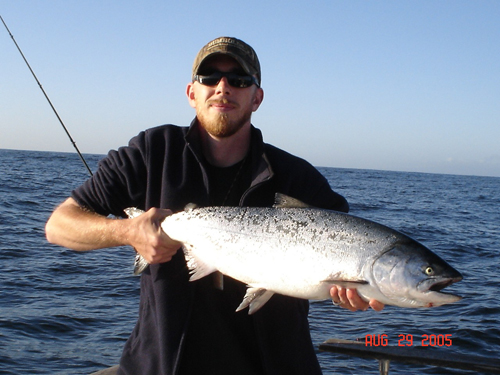
Brian Poxon
Received: 2005
I completed my undergraduate education with a B.S. in Fisheries Biology in May 2005. Since June 2004, I've been working as a research technician at the California Cooperative Fisheries Research Unit. Working for the Fish Coop has enabled me to gain experience with fisheries research techniques including direct observation (snorkel surveys), depletion-removal electrofishing, habitat surveys, and mark-recapture. In addition, I've also been able to conduct research in some of the area's most magnificent terrain. Despite suggestions that I should enter graduate school immediately, I have decided to remain in the area for a few years and continue getting experience with the planning, field-work, and analysis stages of small stream fisheries investigation. I am taking the GRE in Fall of 2005 and will be applying to graduate programs with the intention of beginning my graduate education in 2 years. Ultimately, I would like to be in a position to monitor wild trout populations in the Sierra Nevada range and to protect their native streams from the effects of ever-increasing human population. With the education I received from Humboldt and a deep-seated love for all things wild, the sky is the limit.






